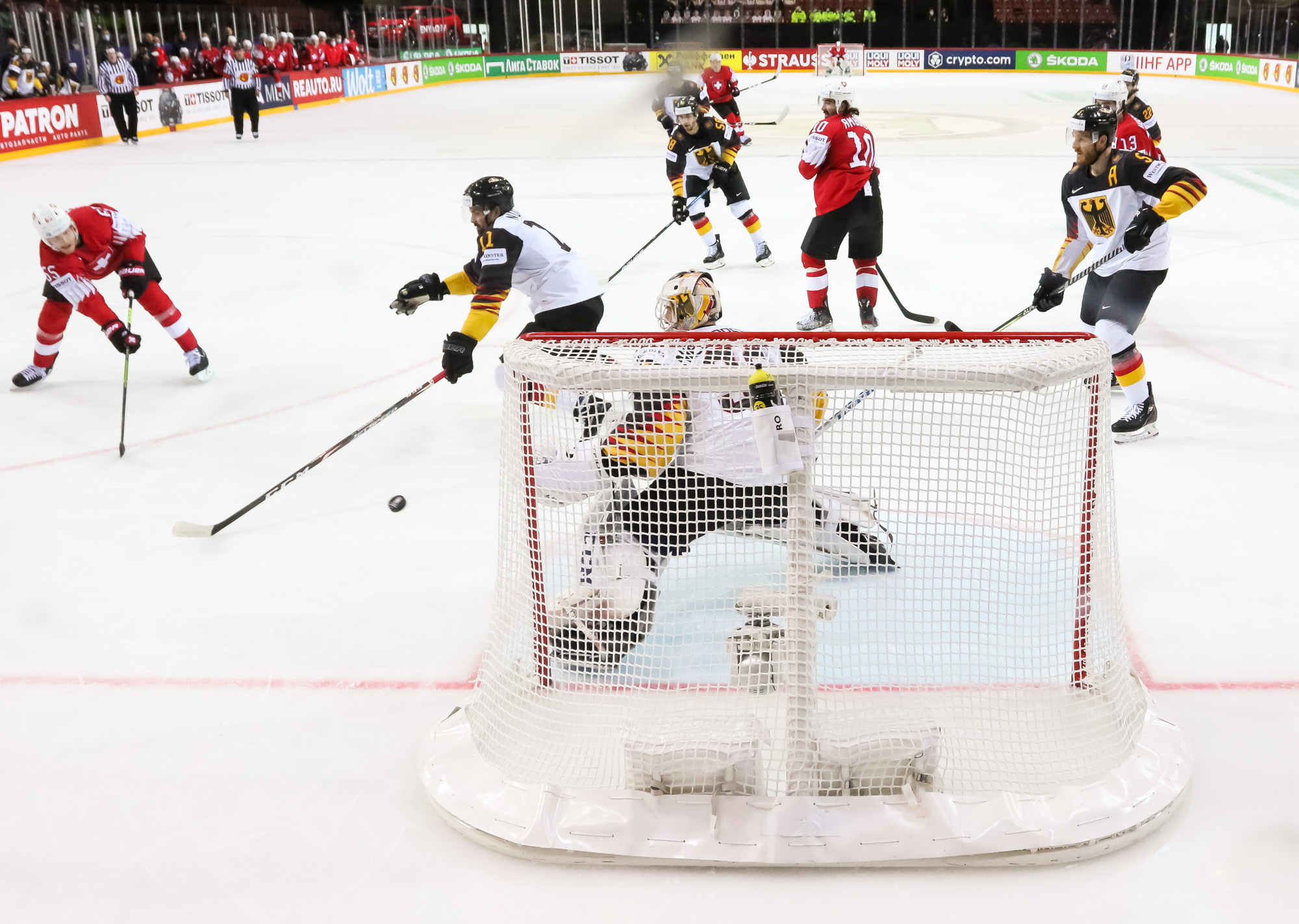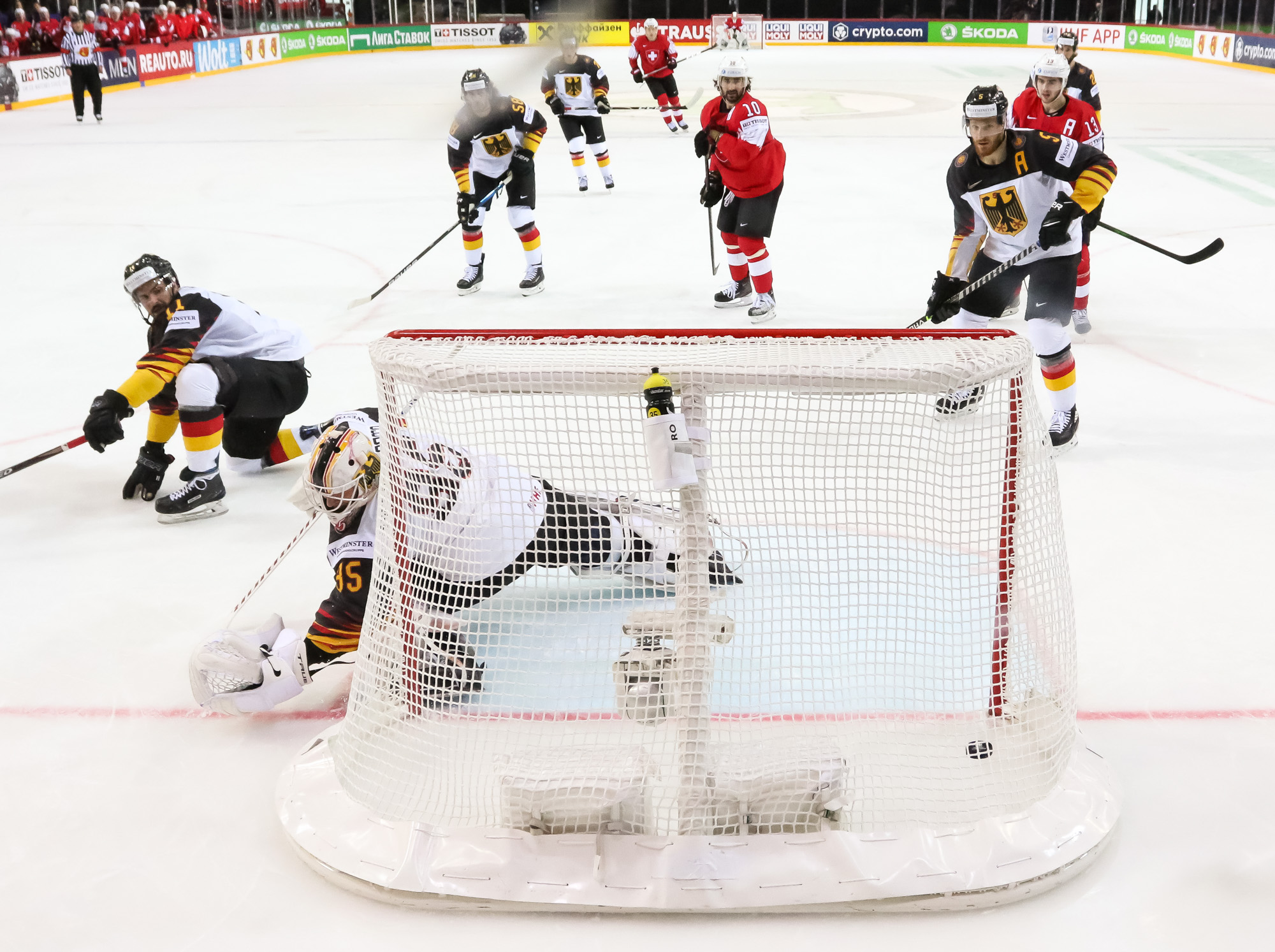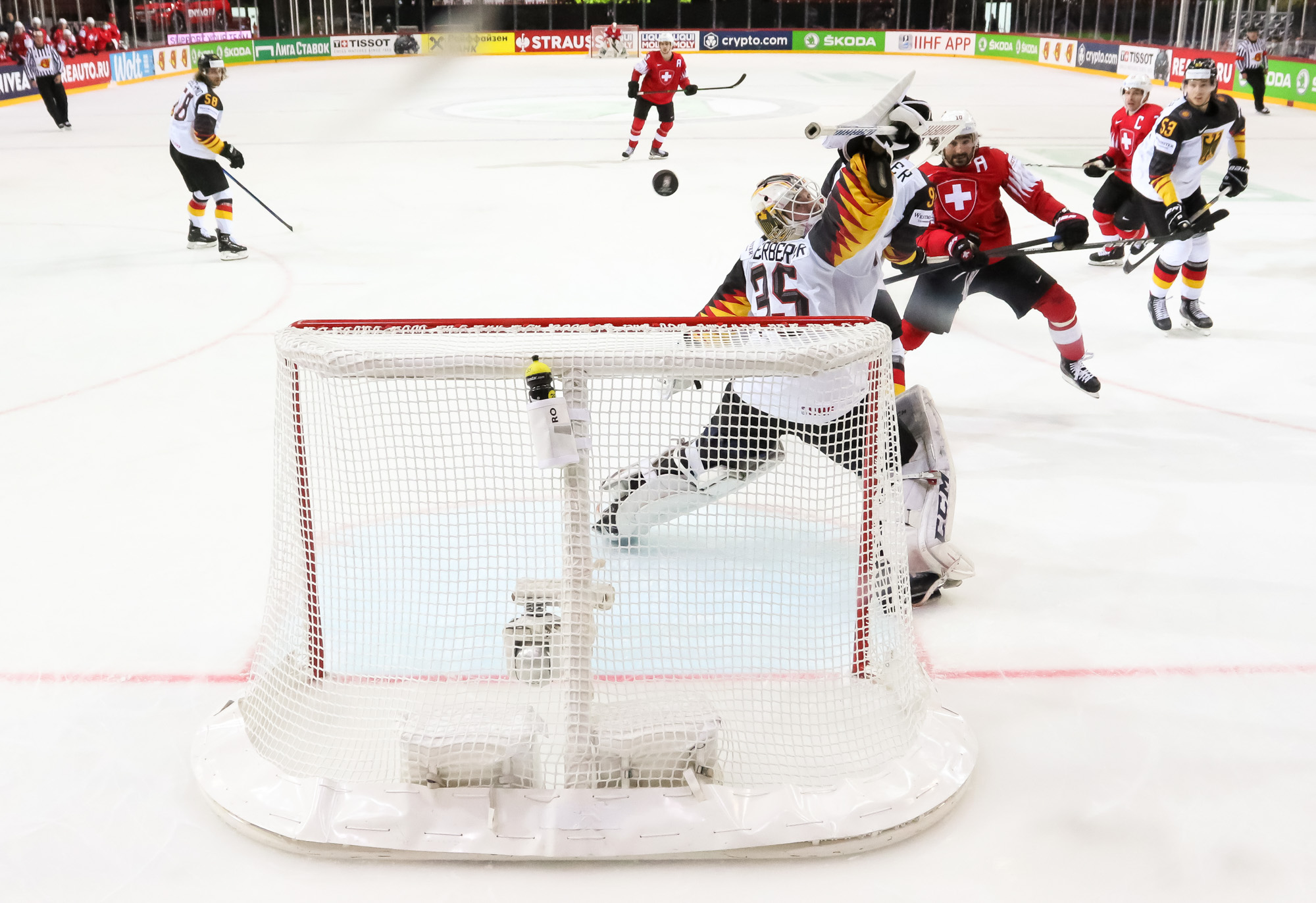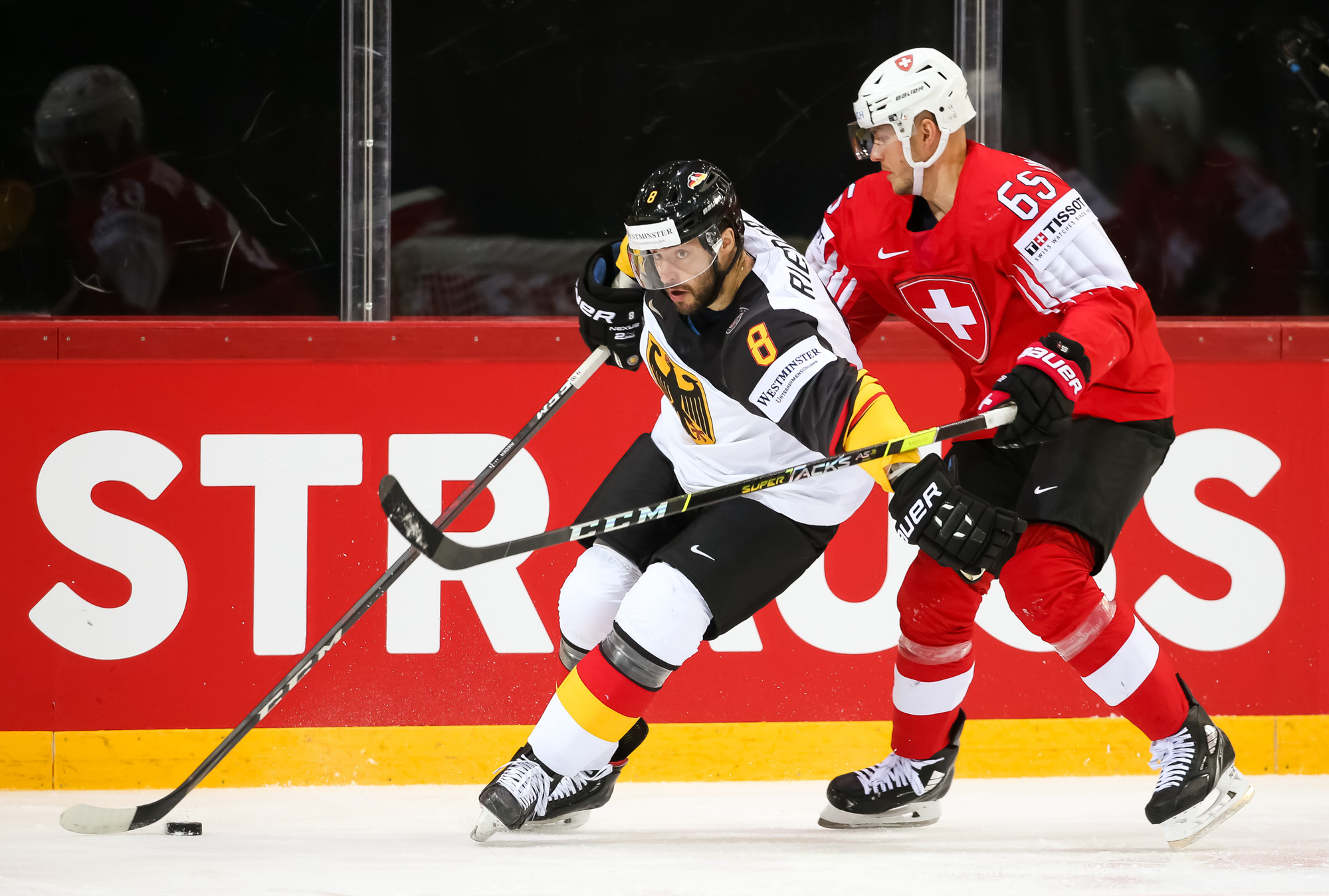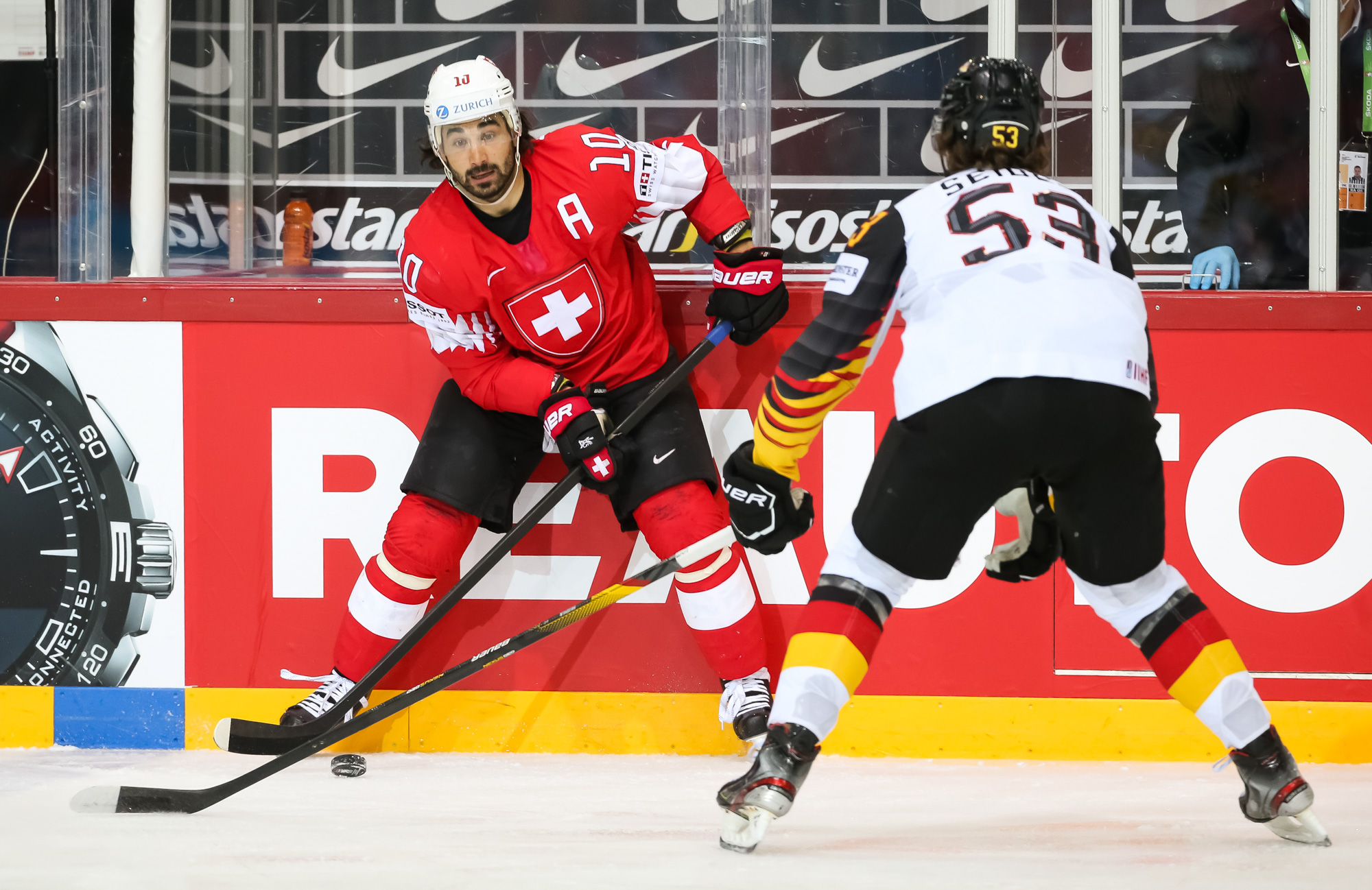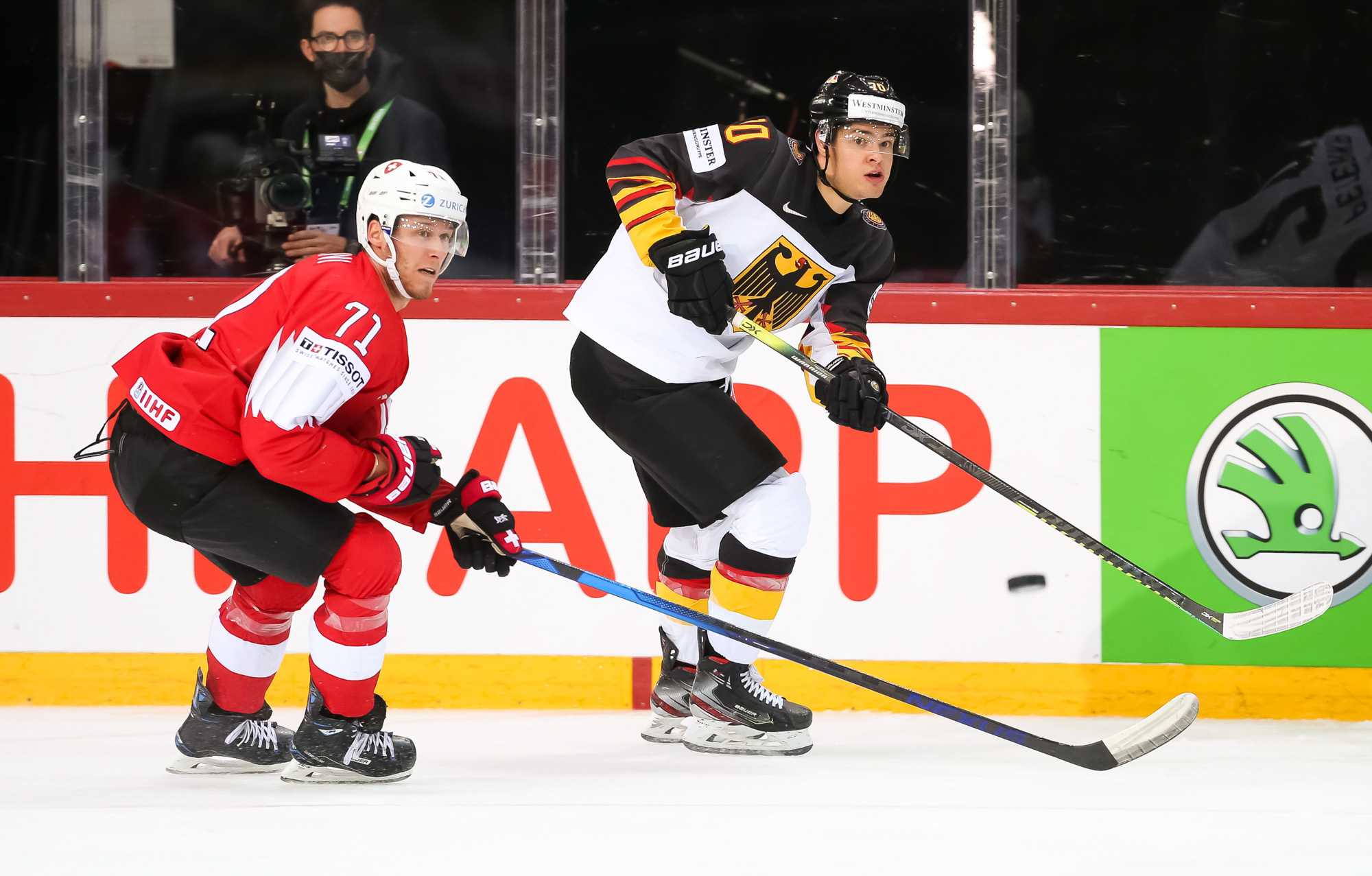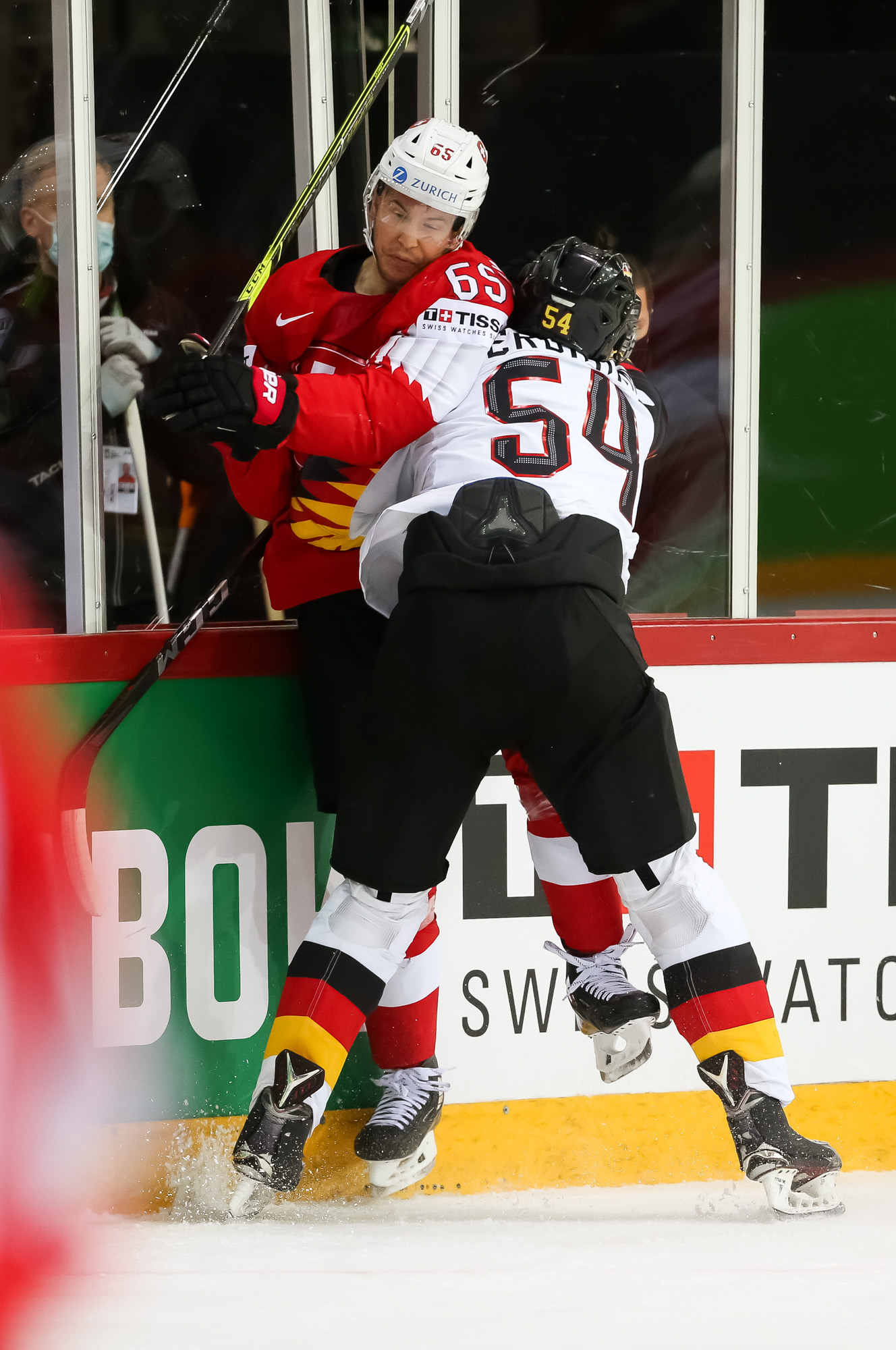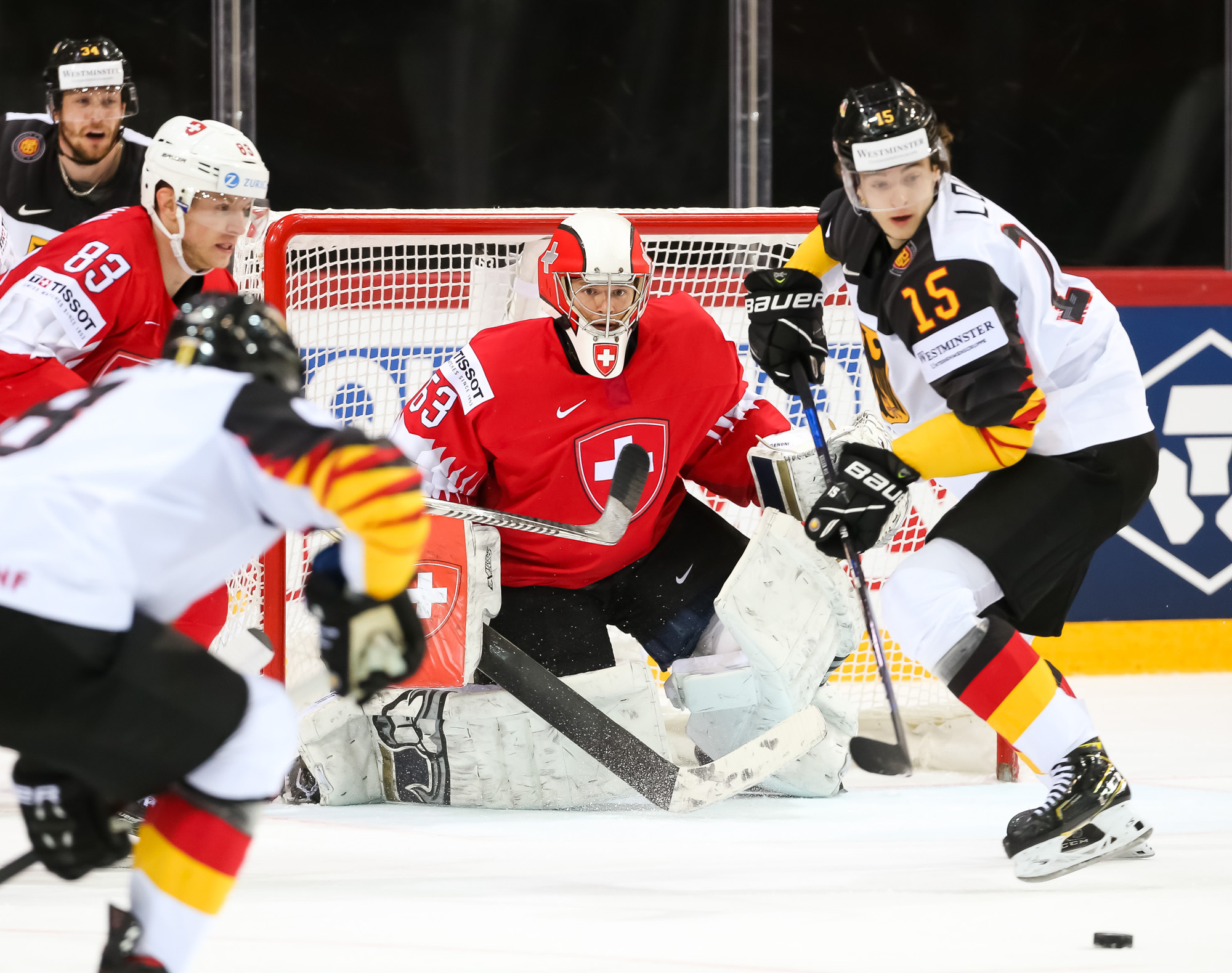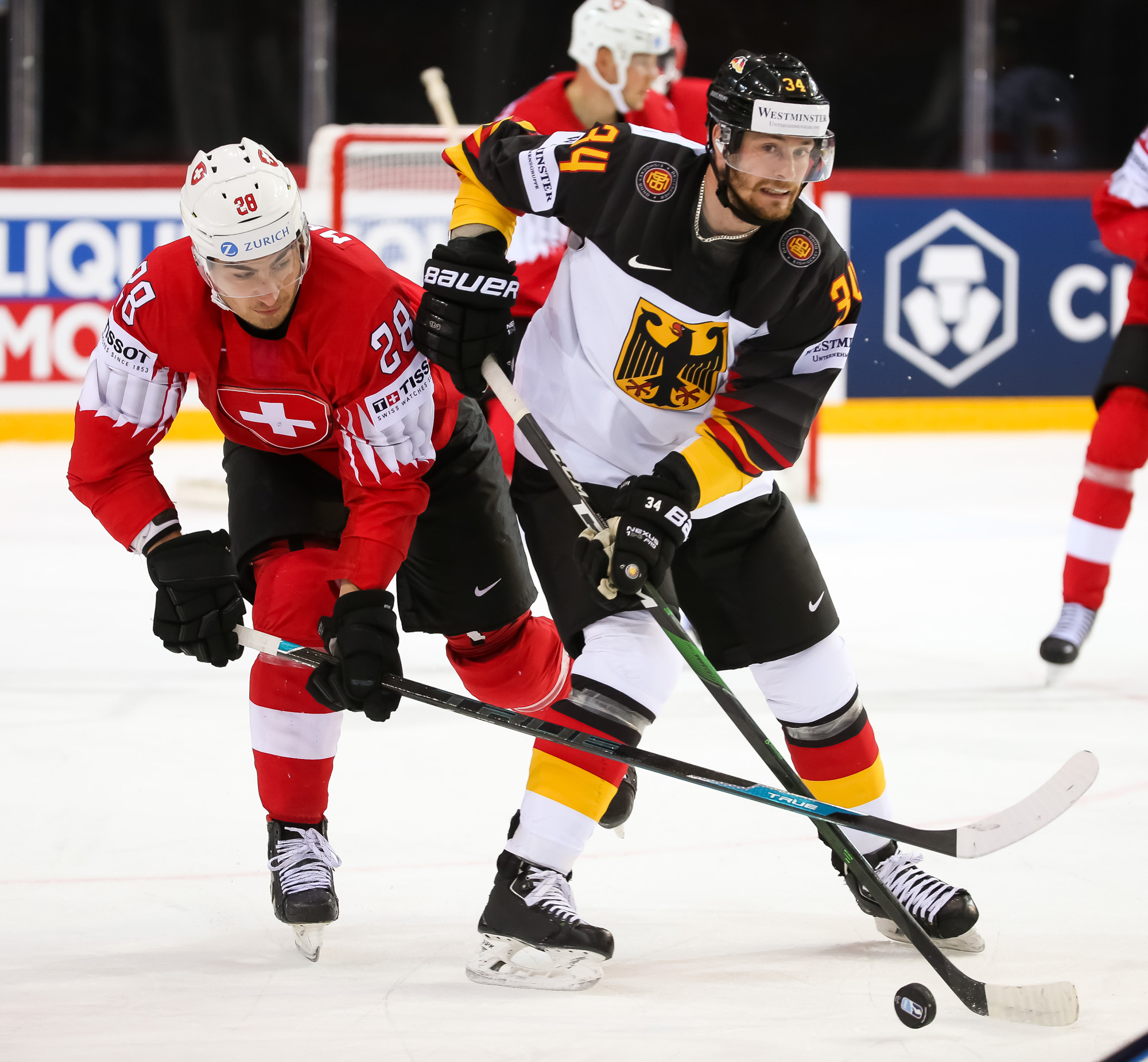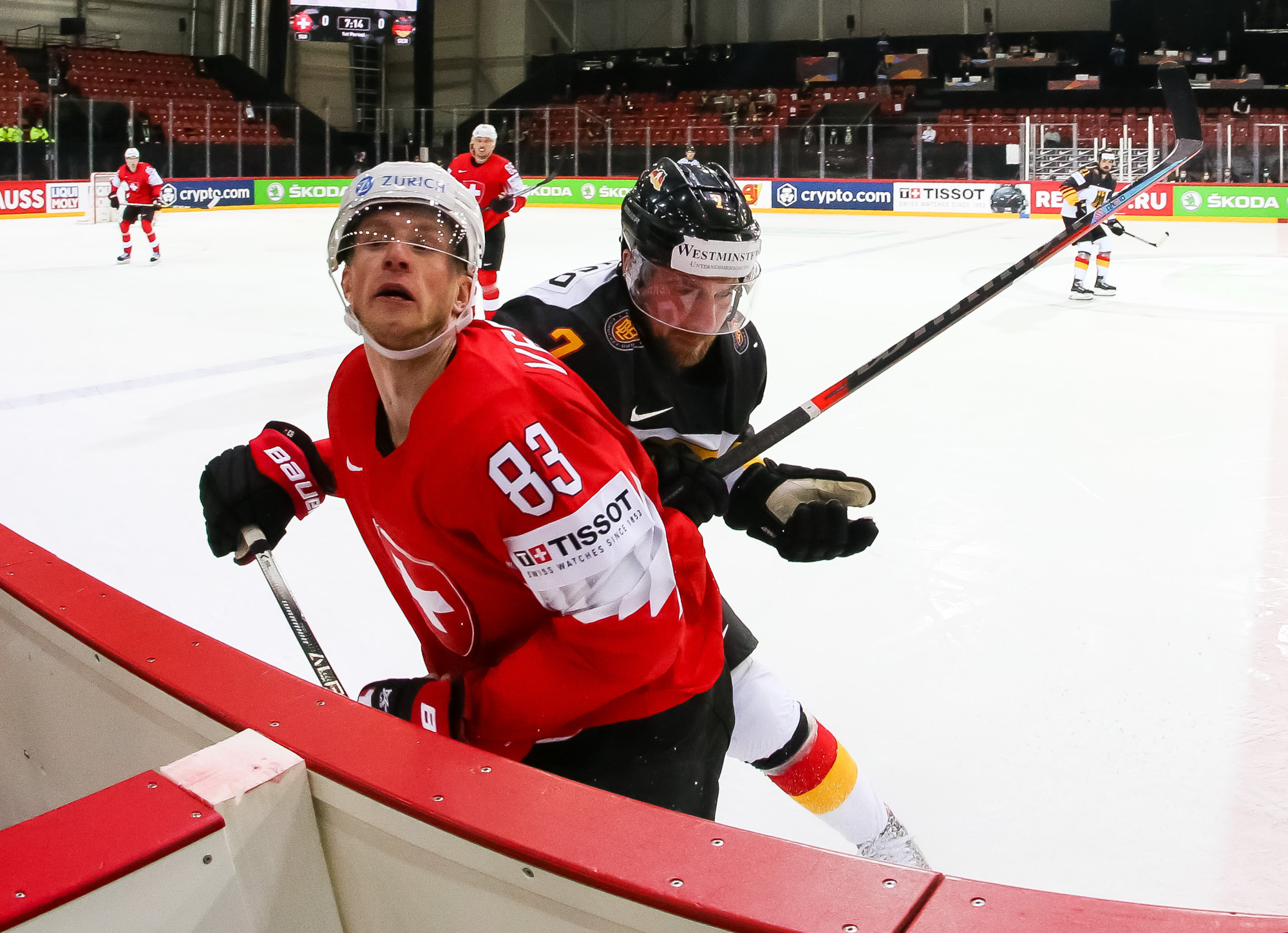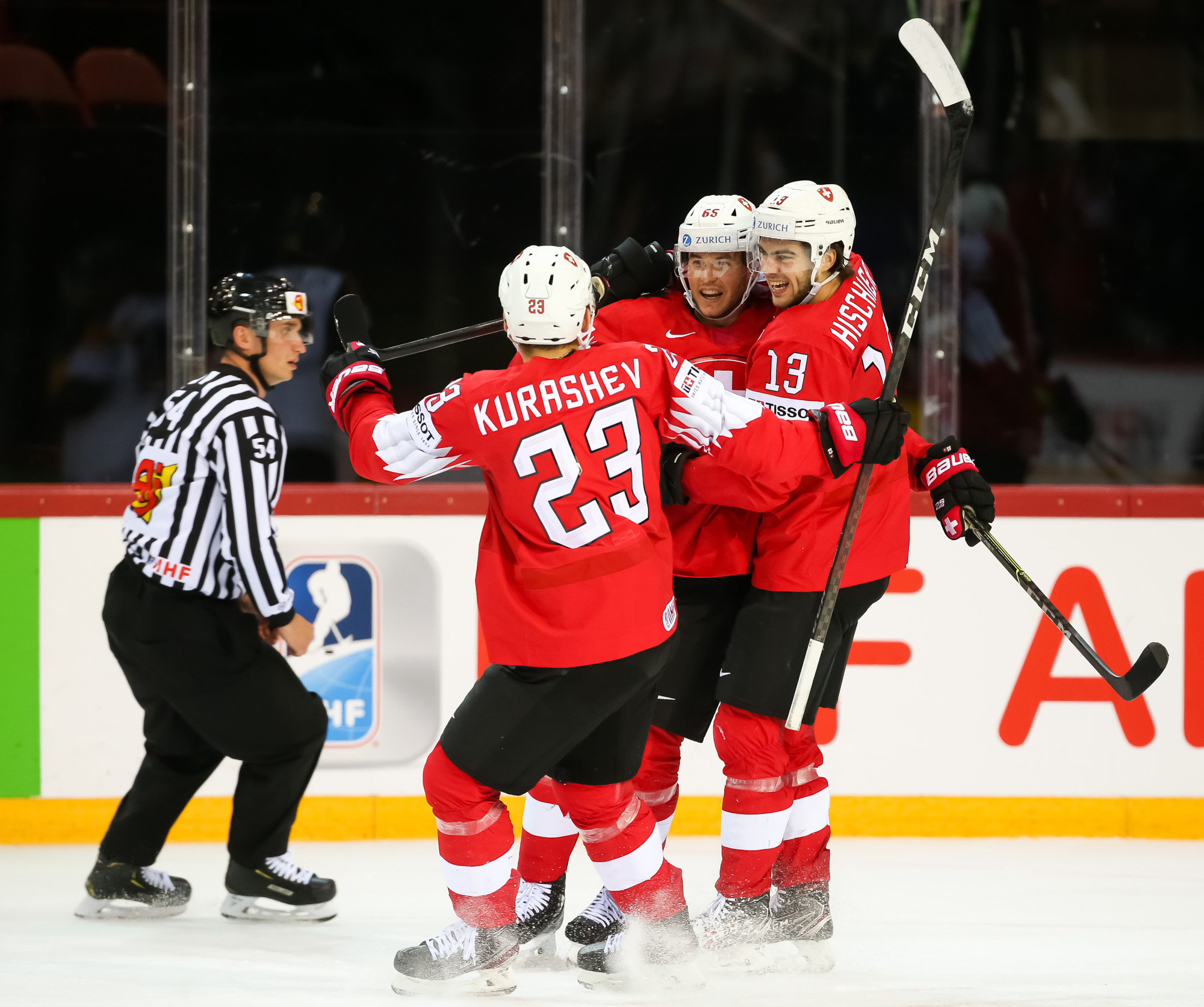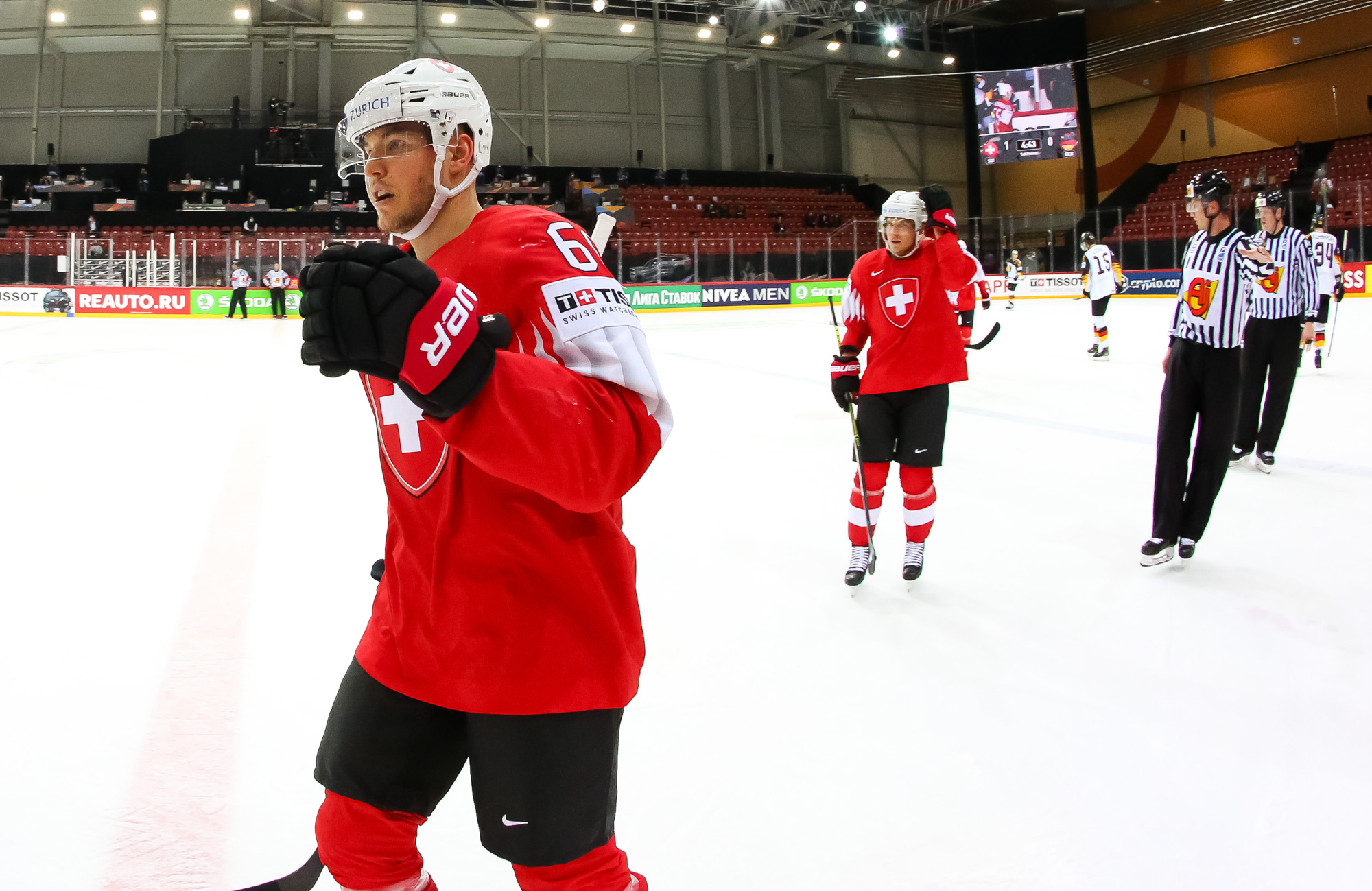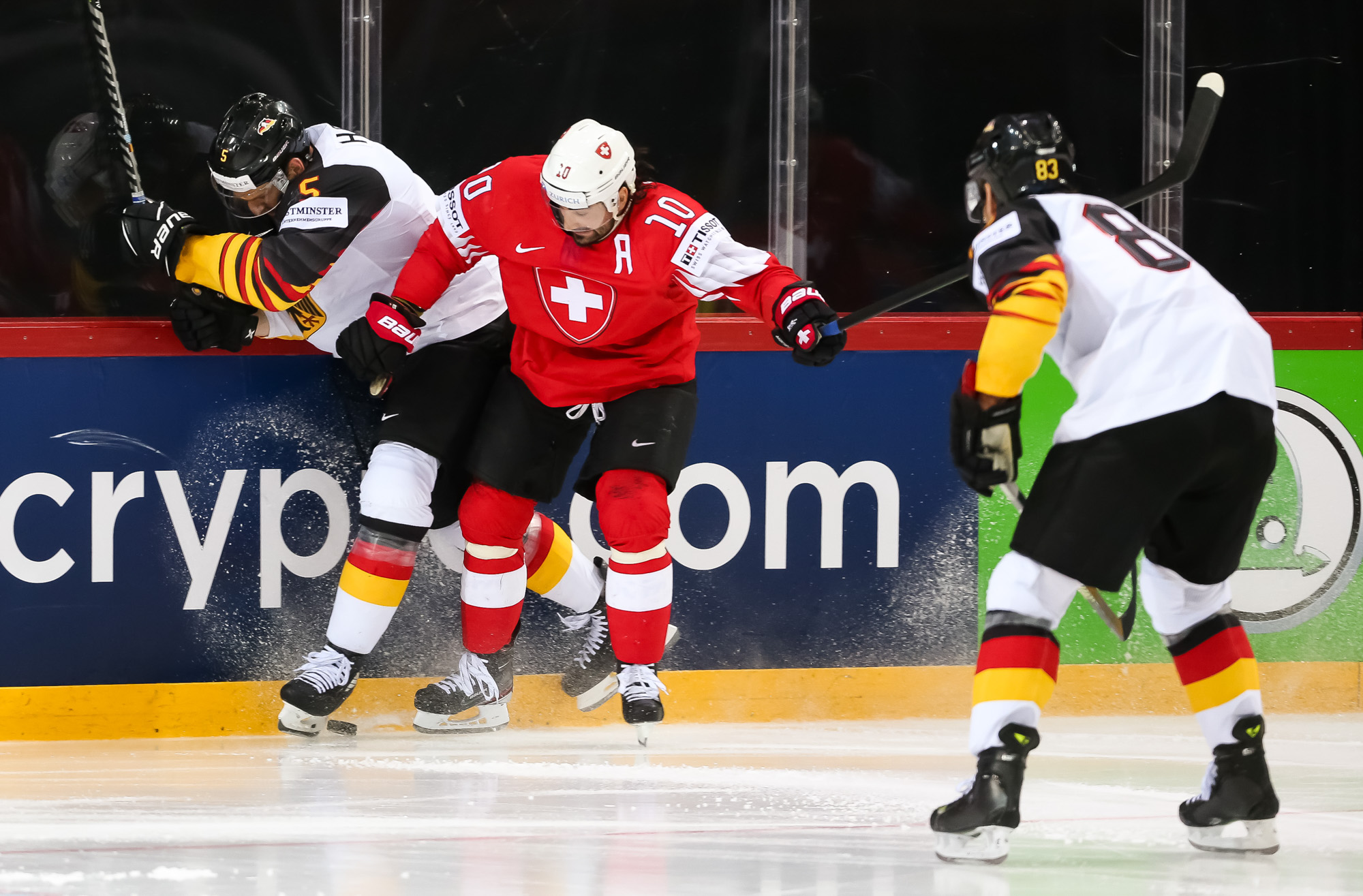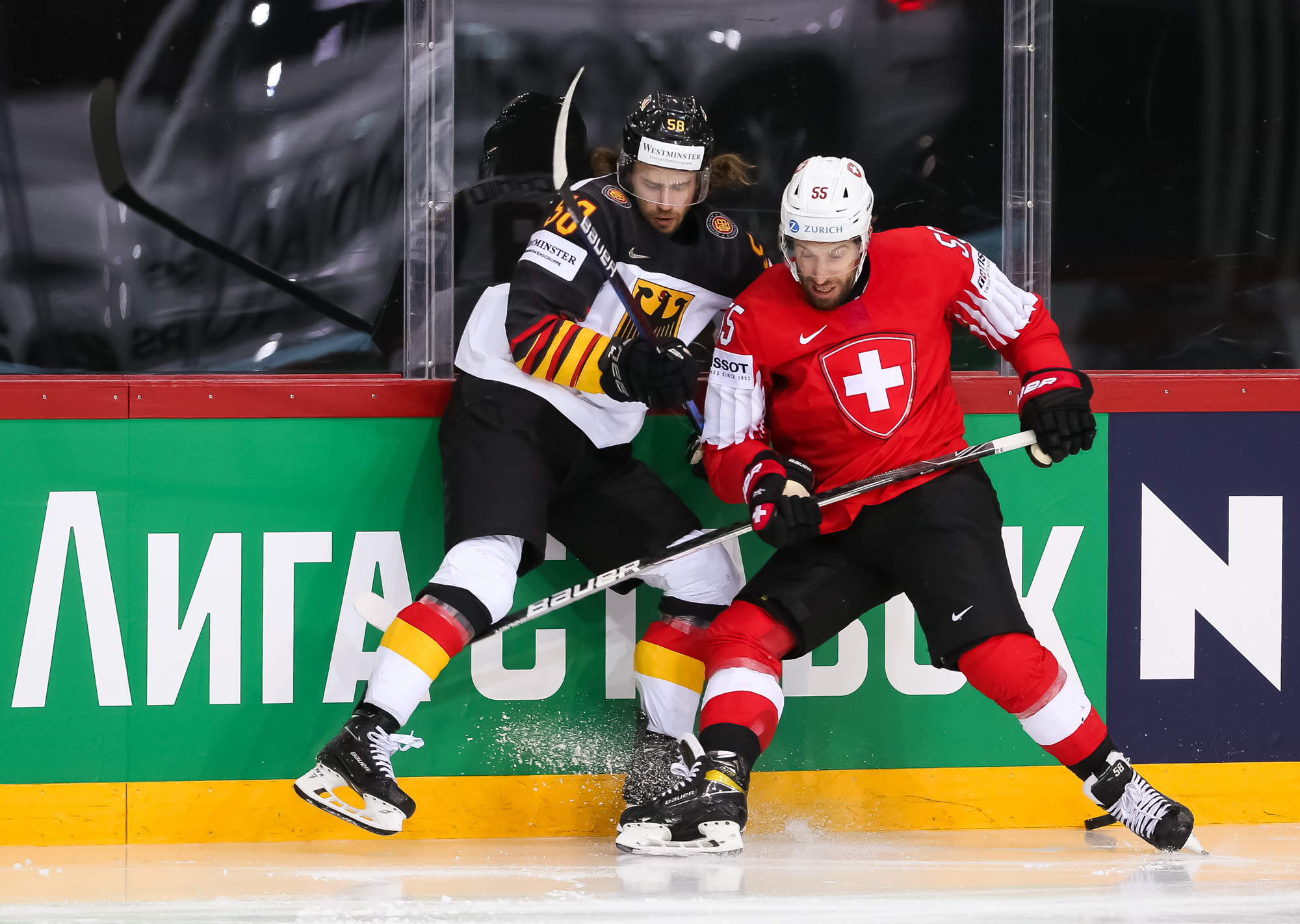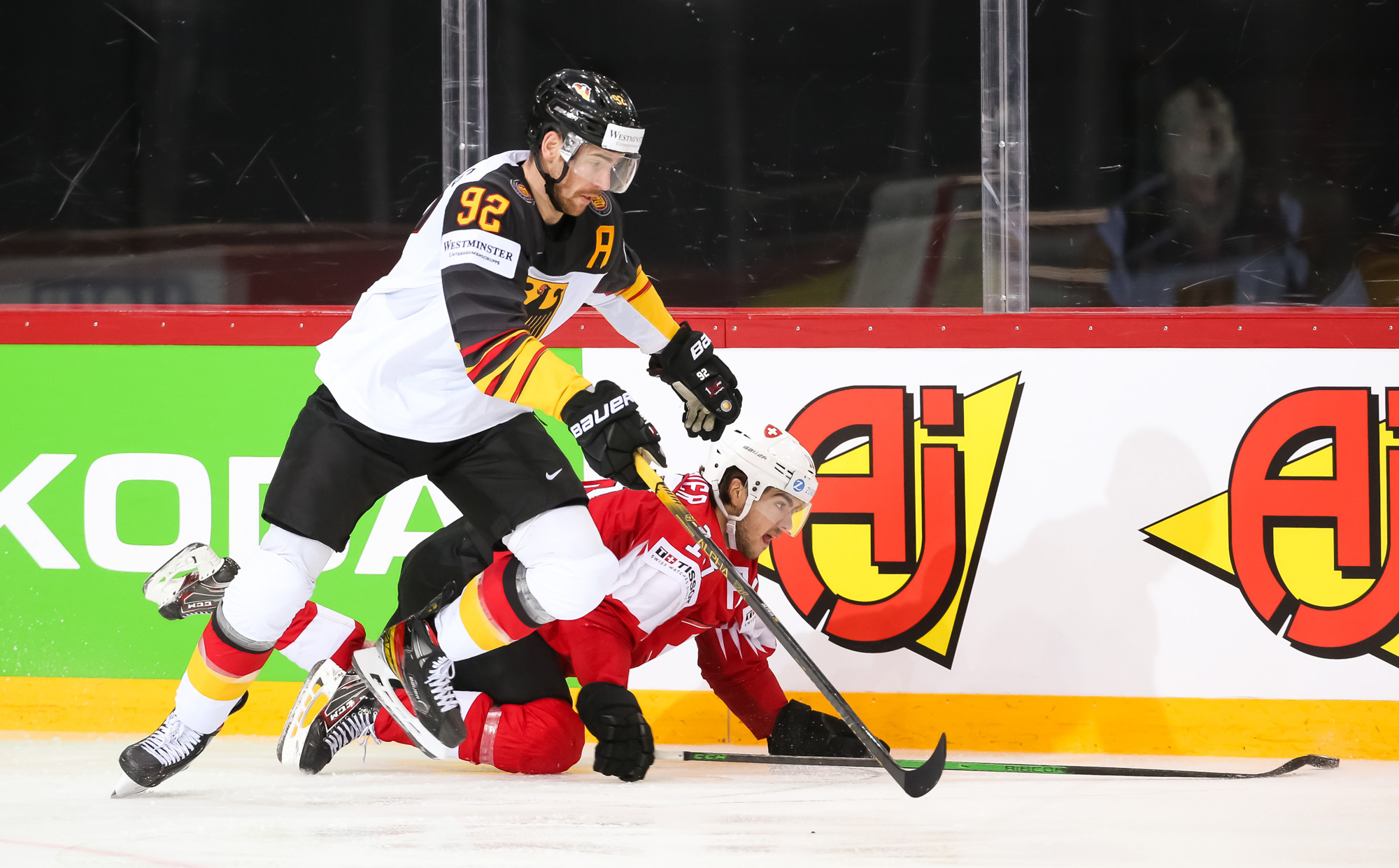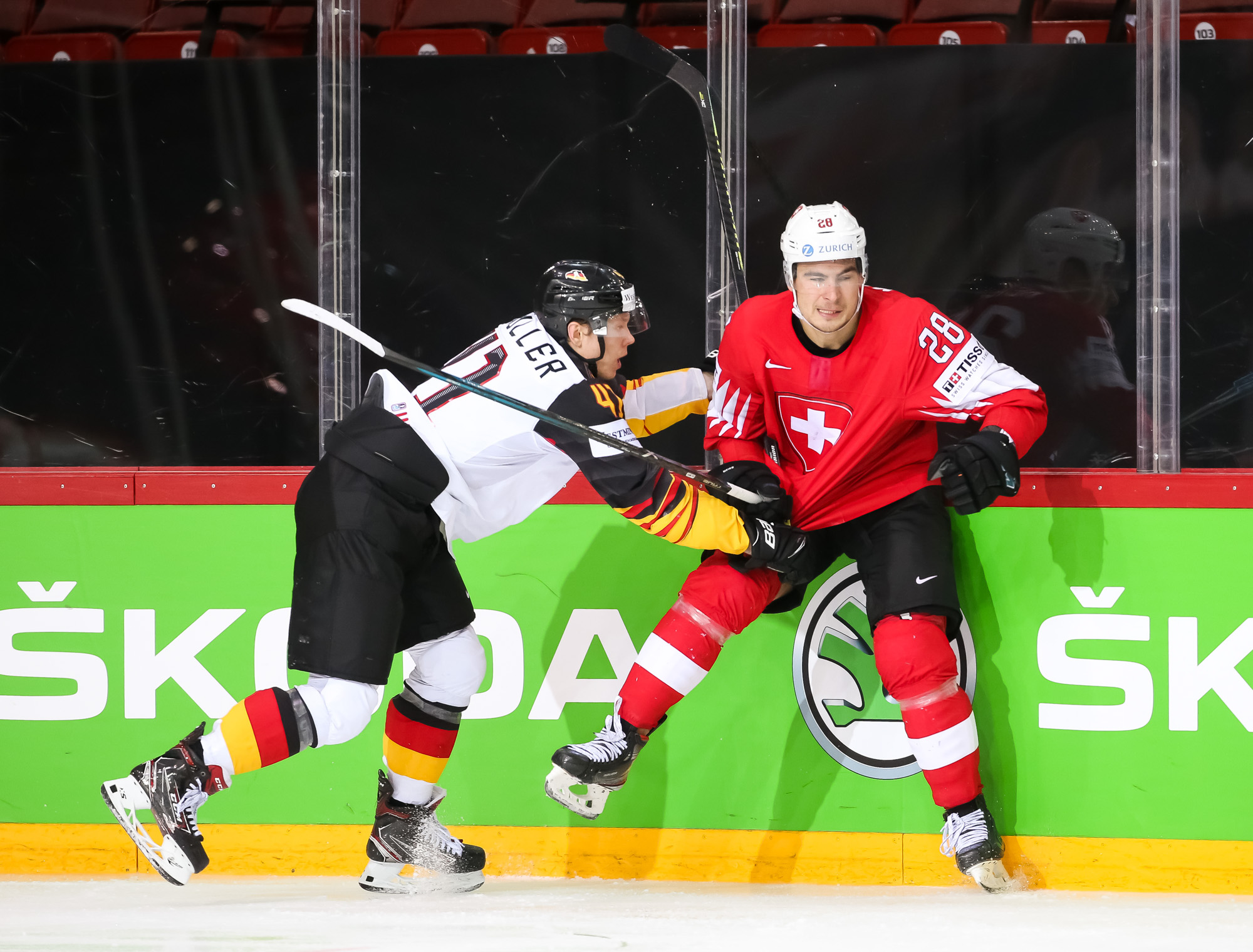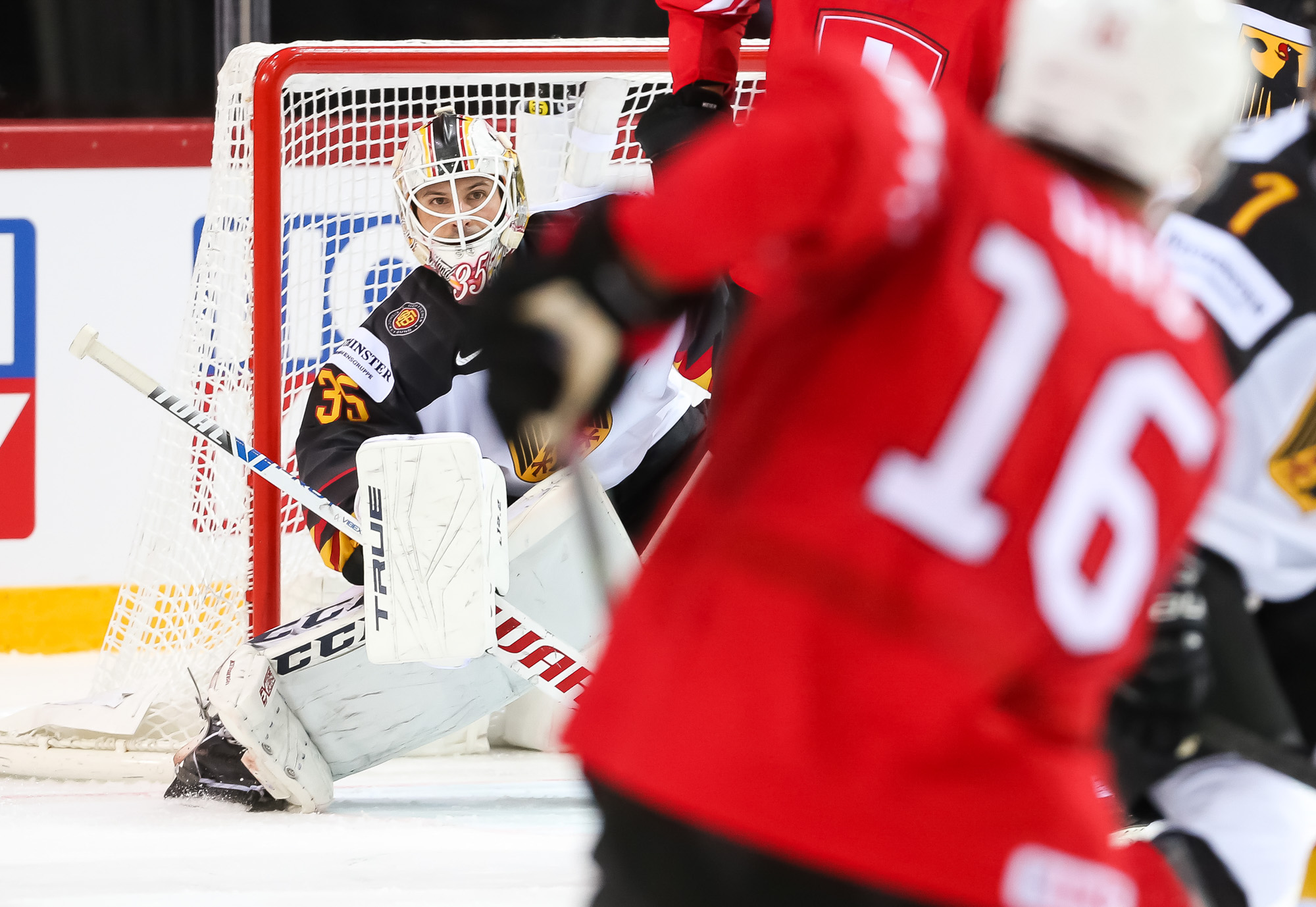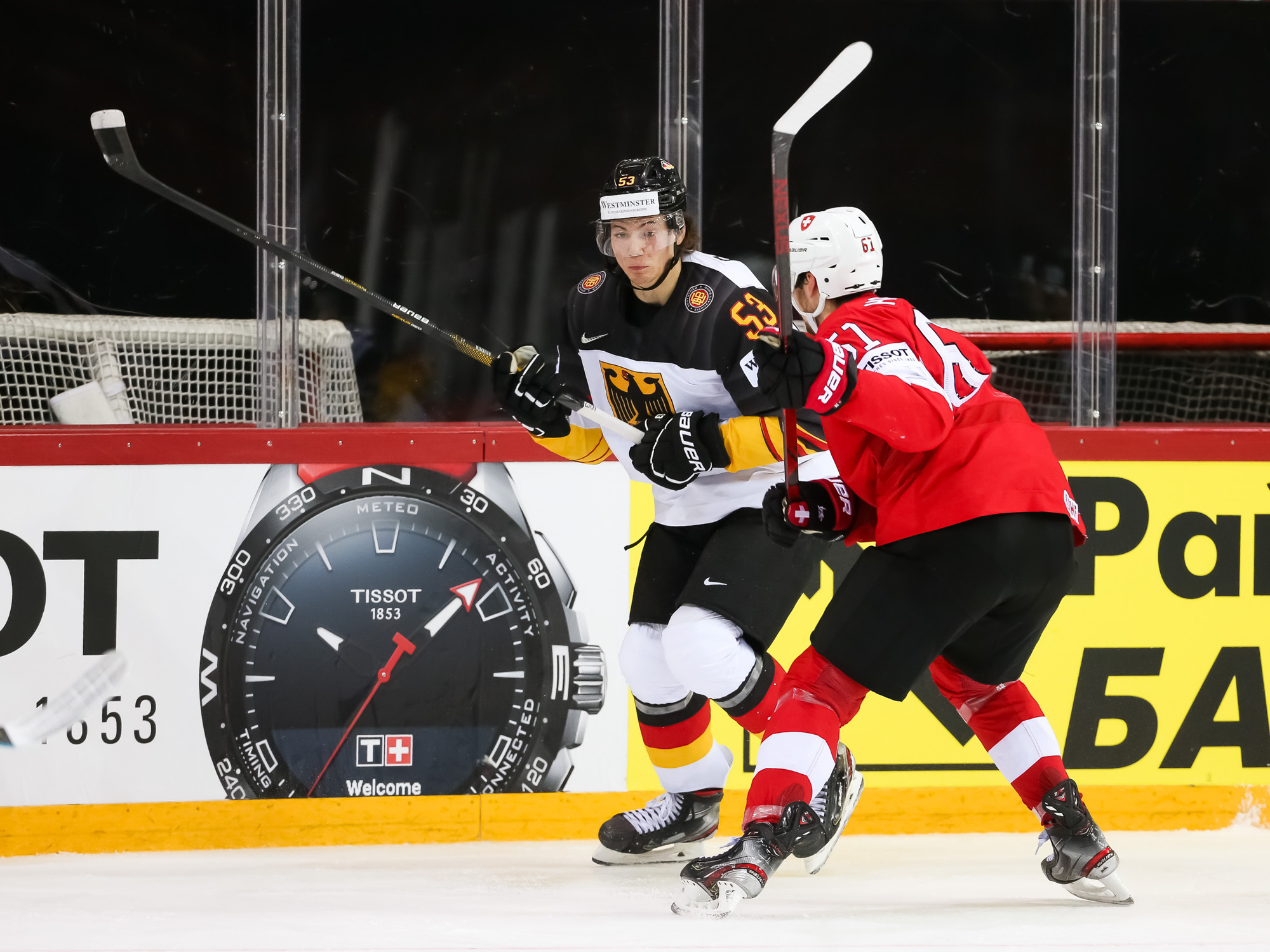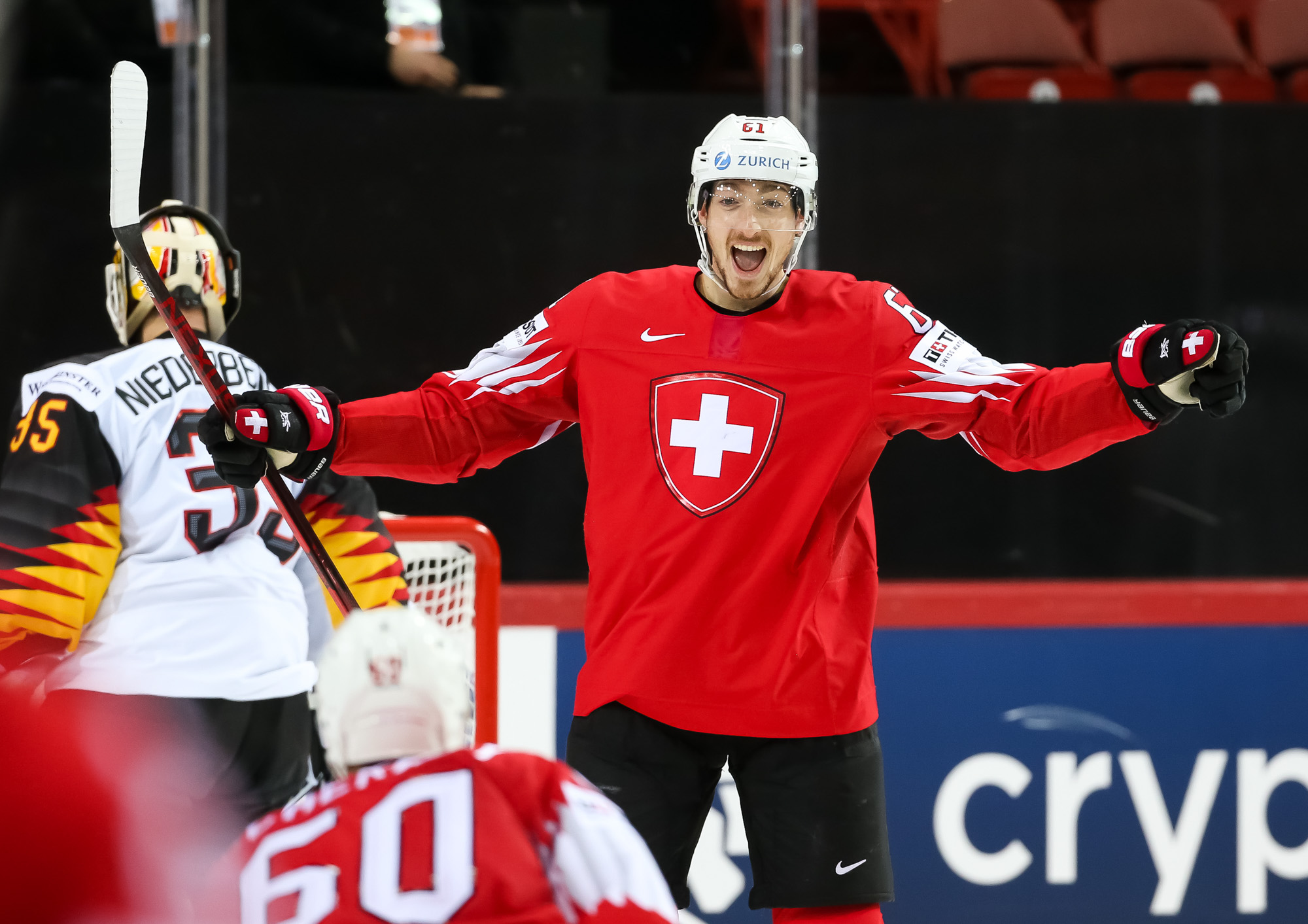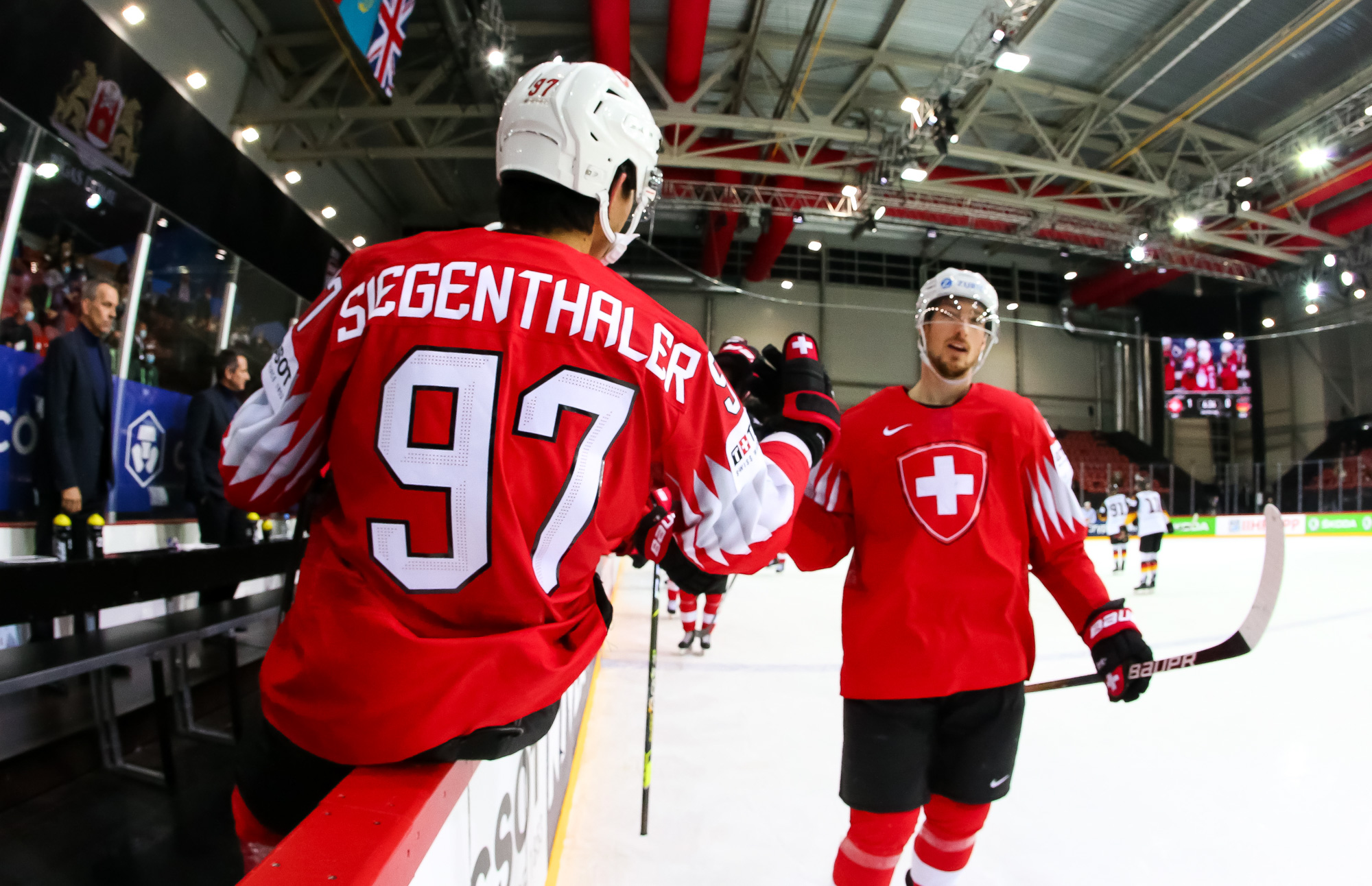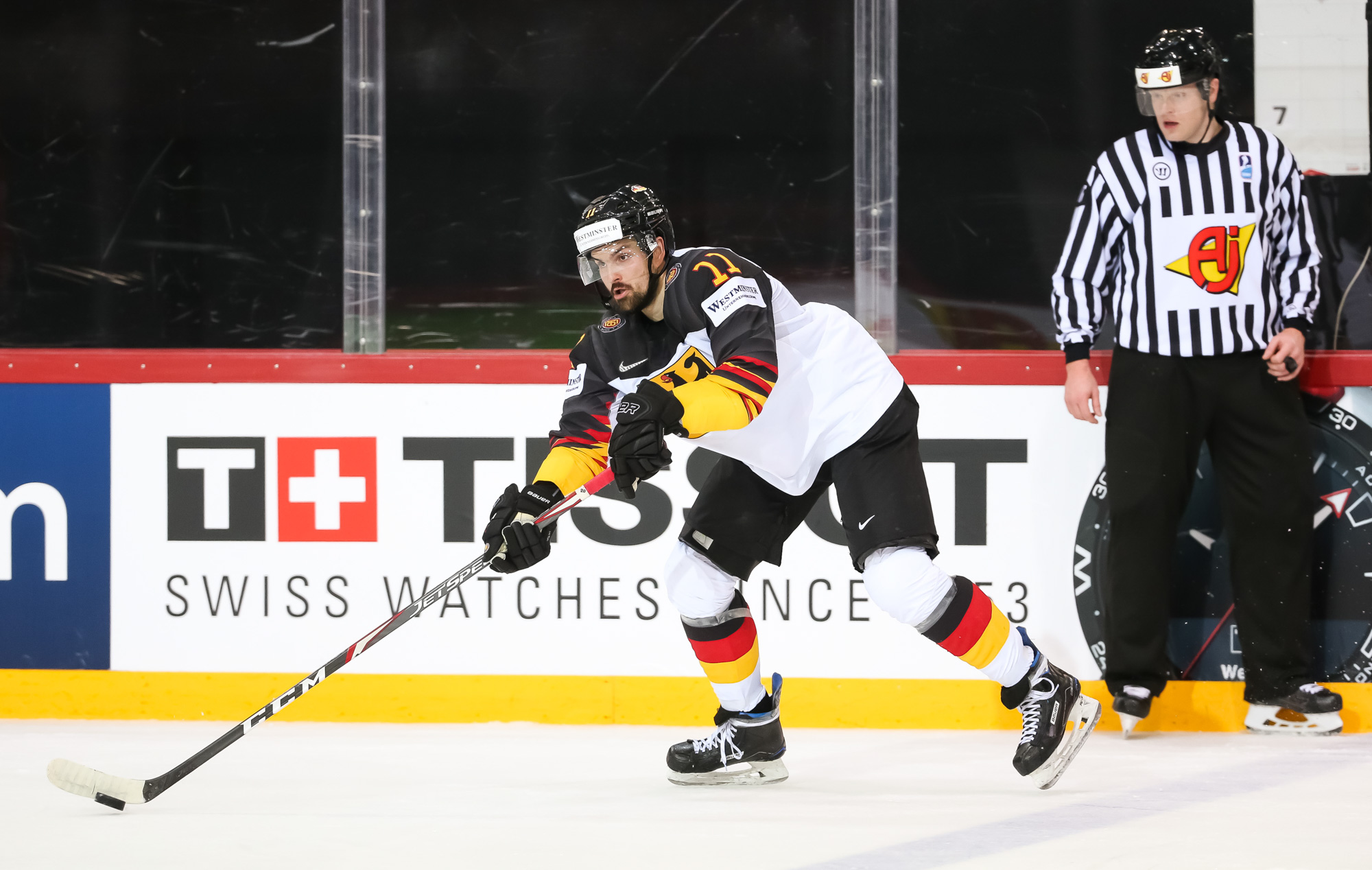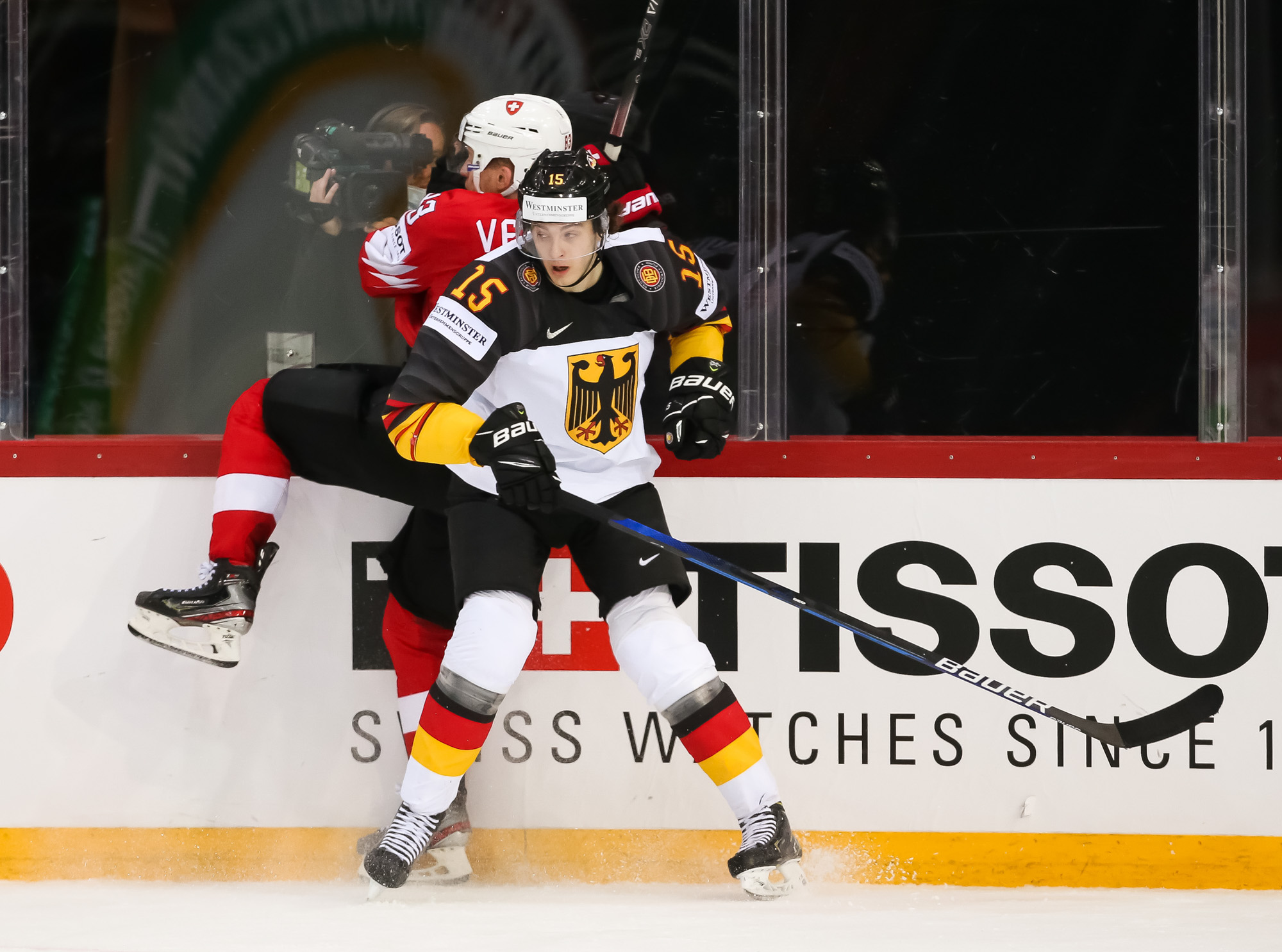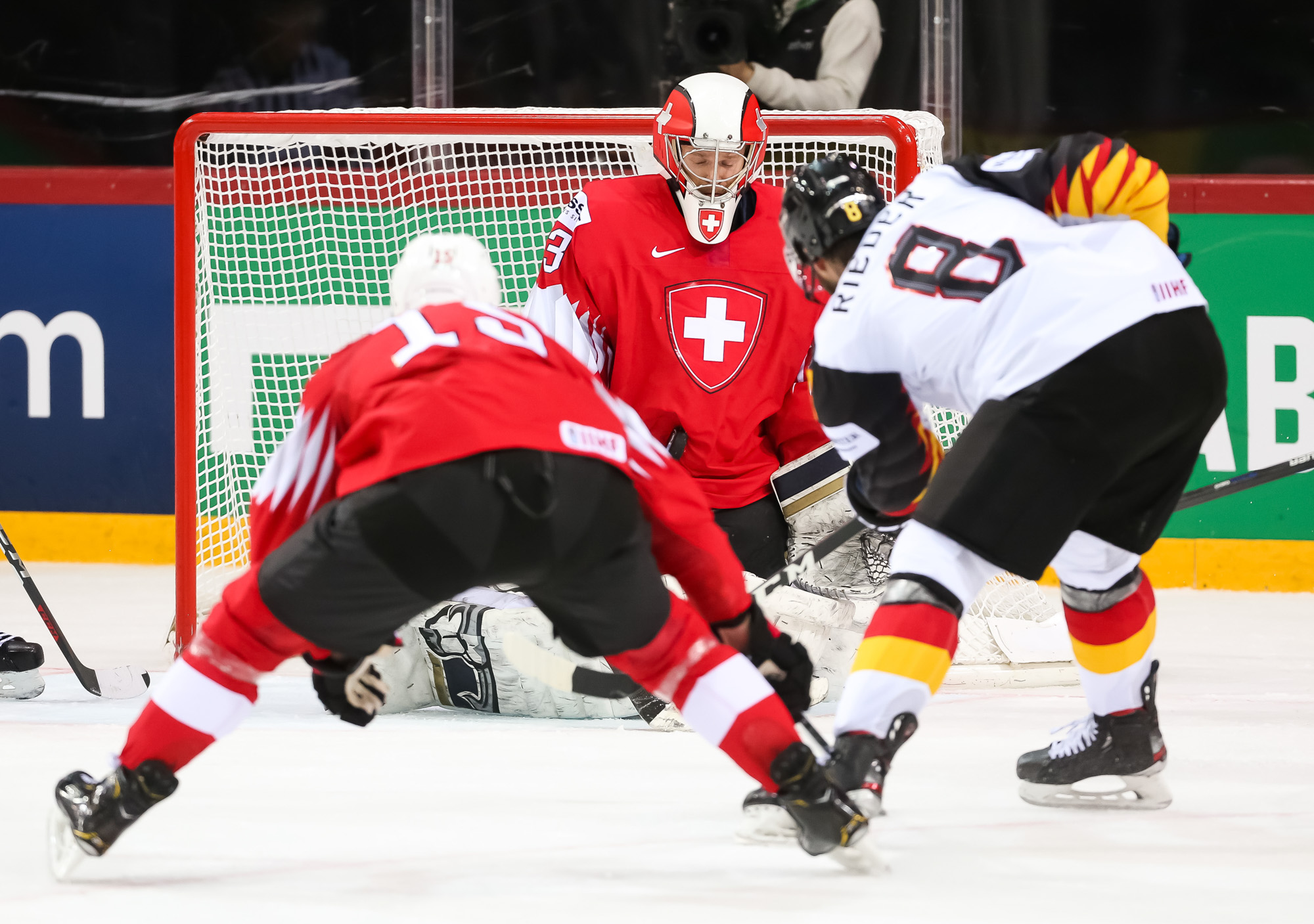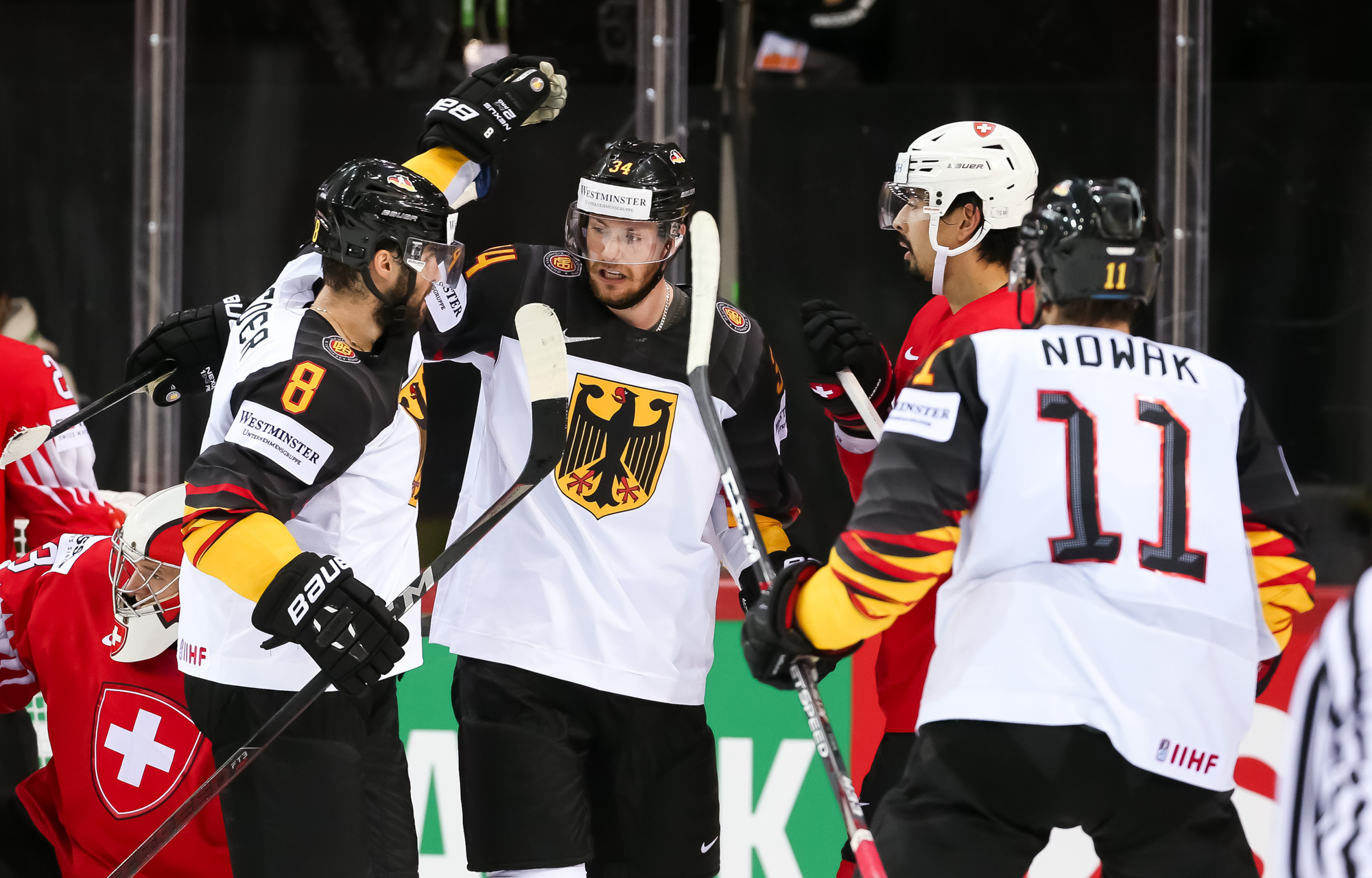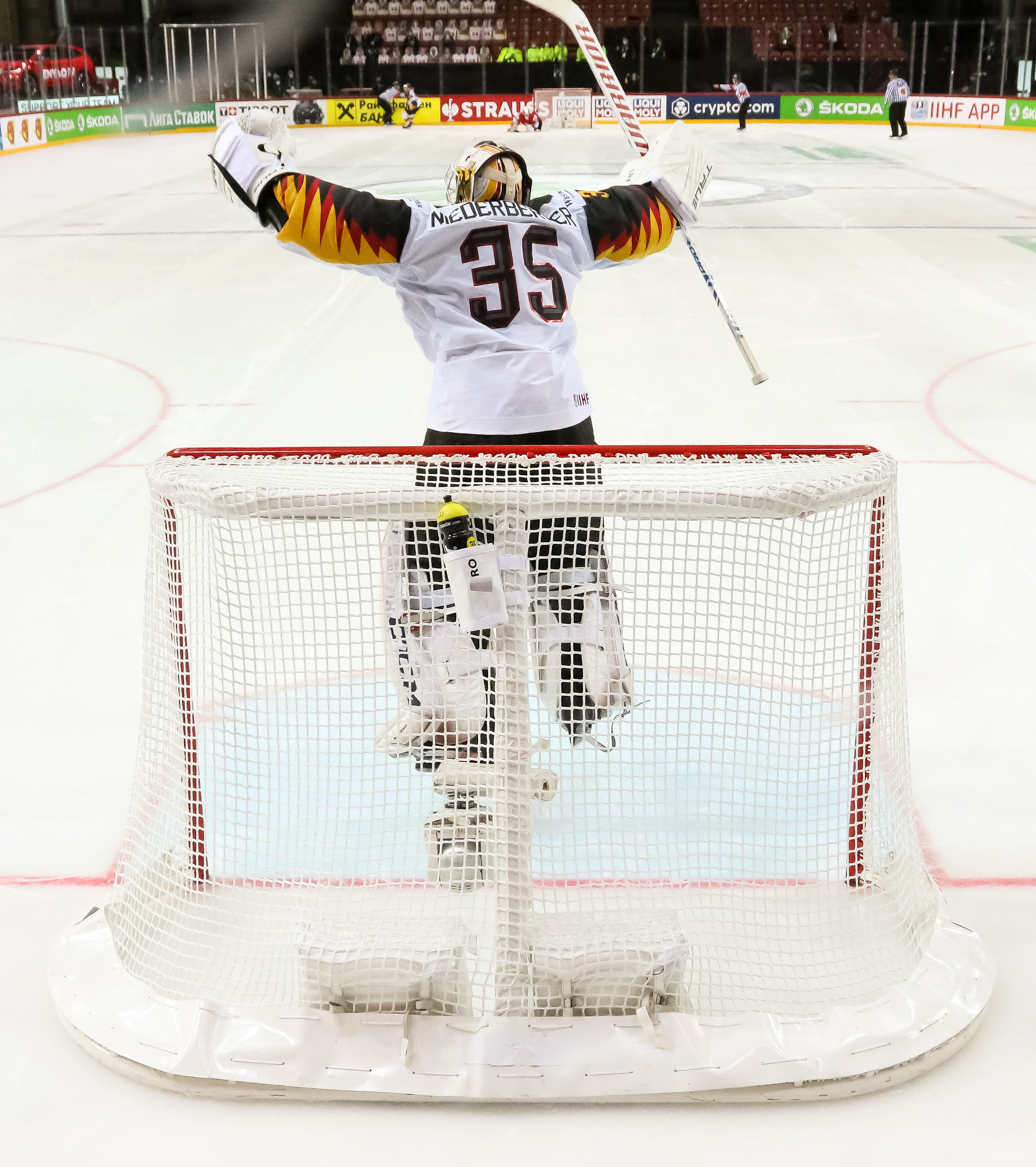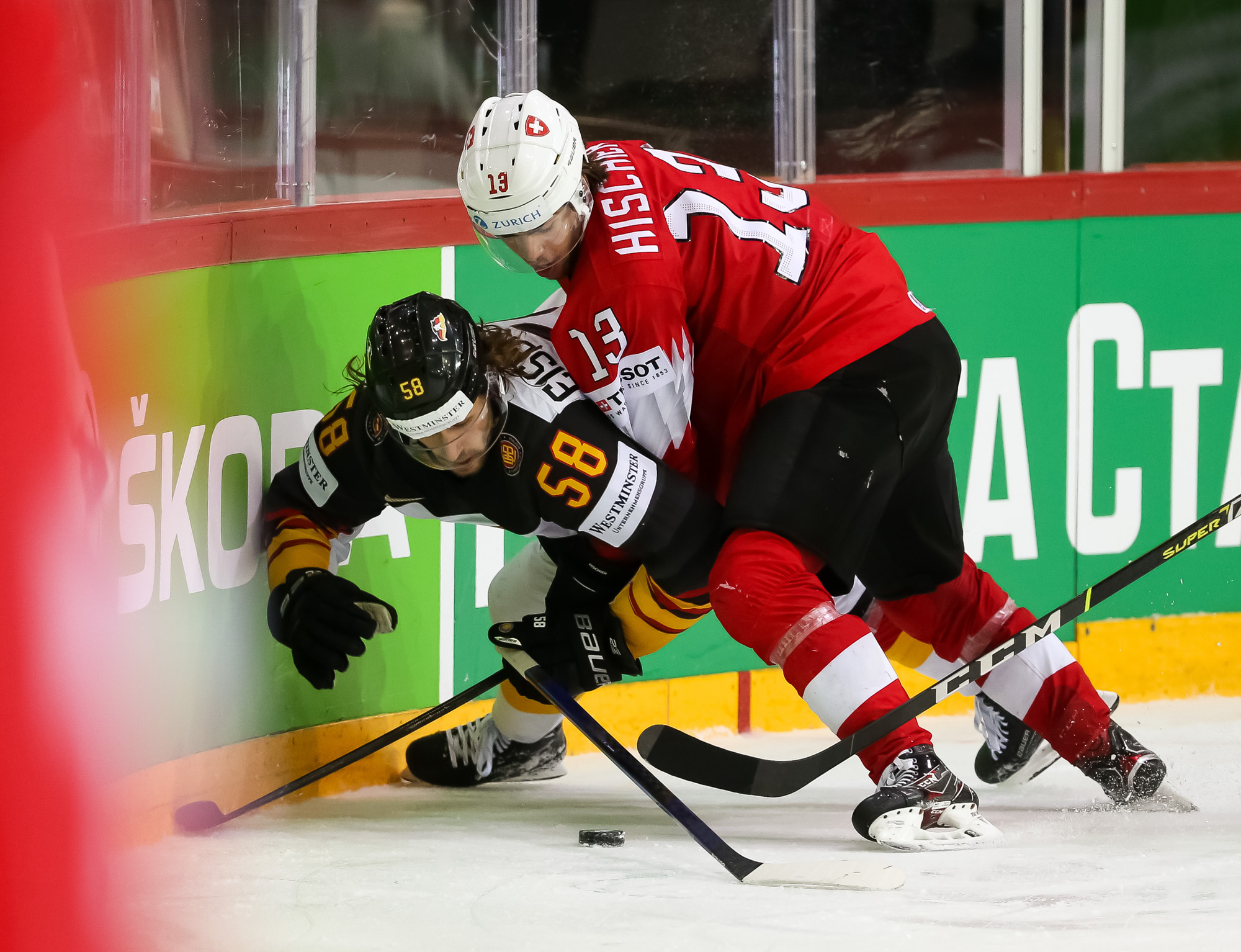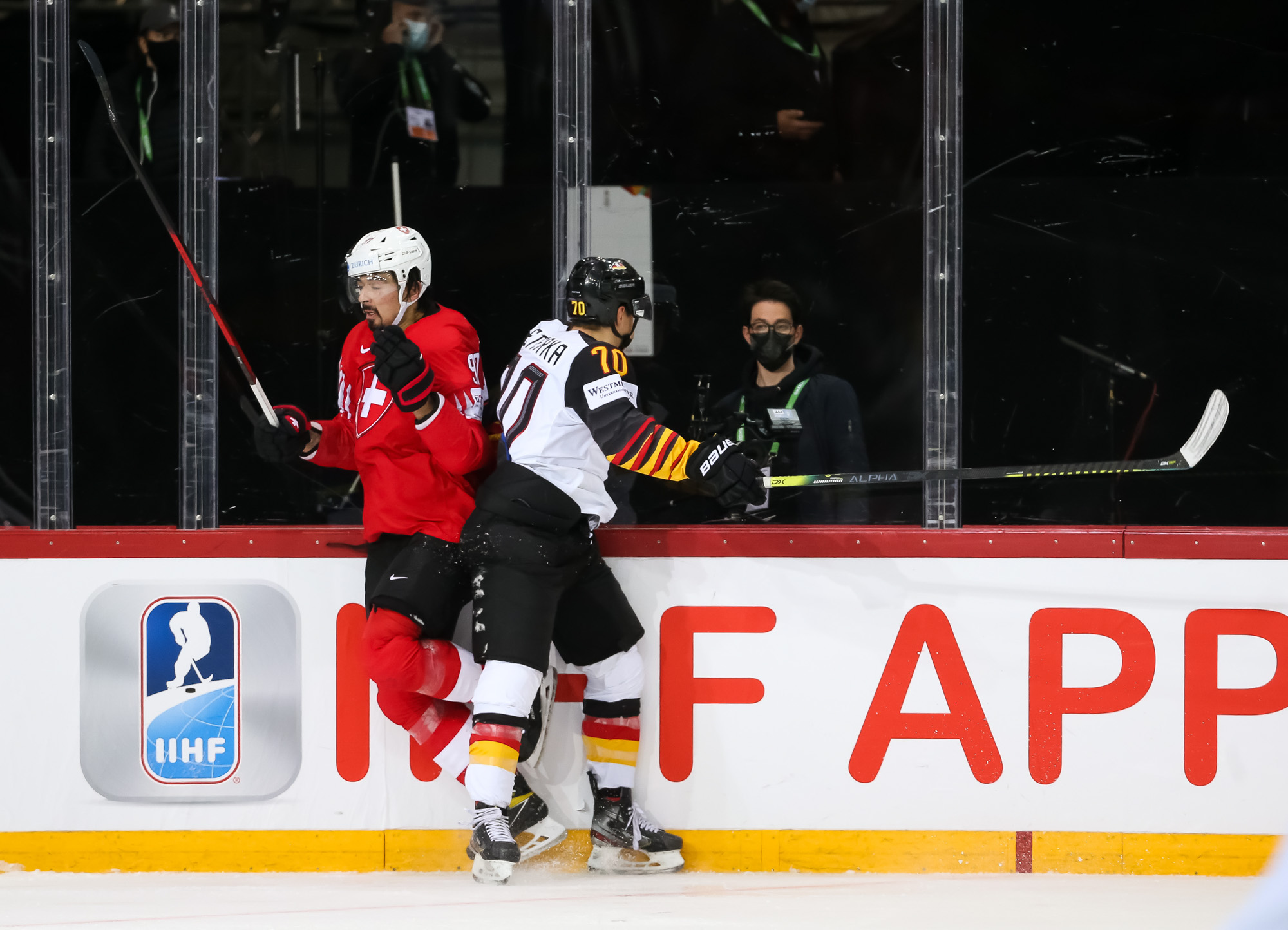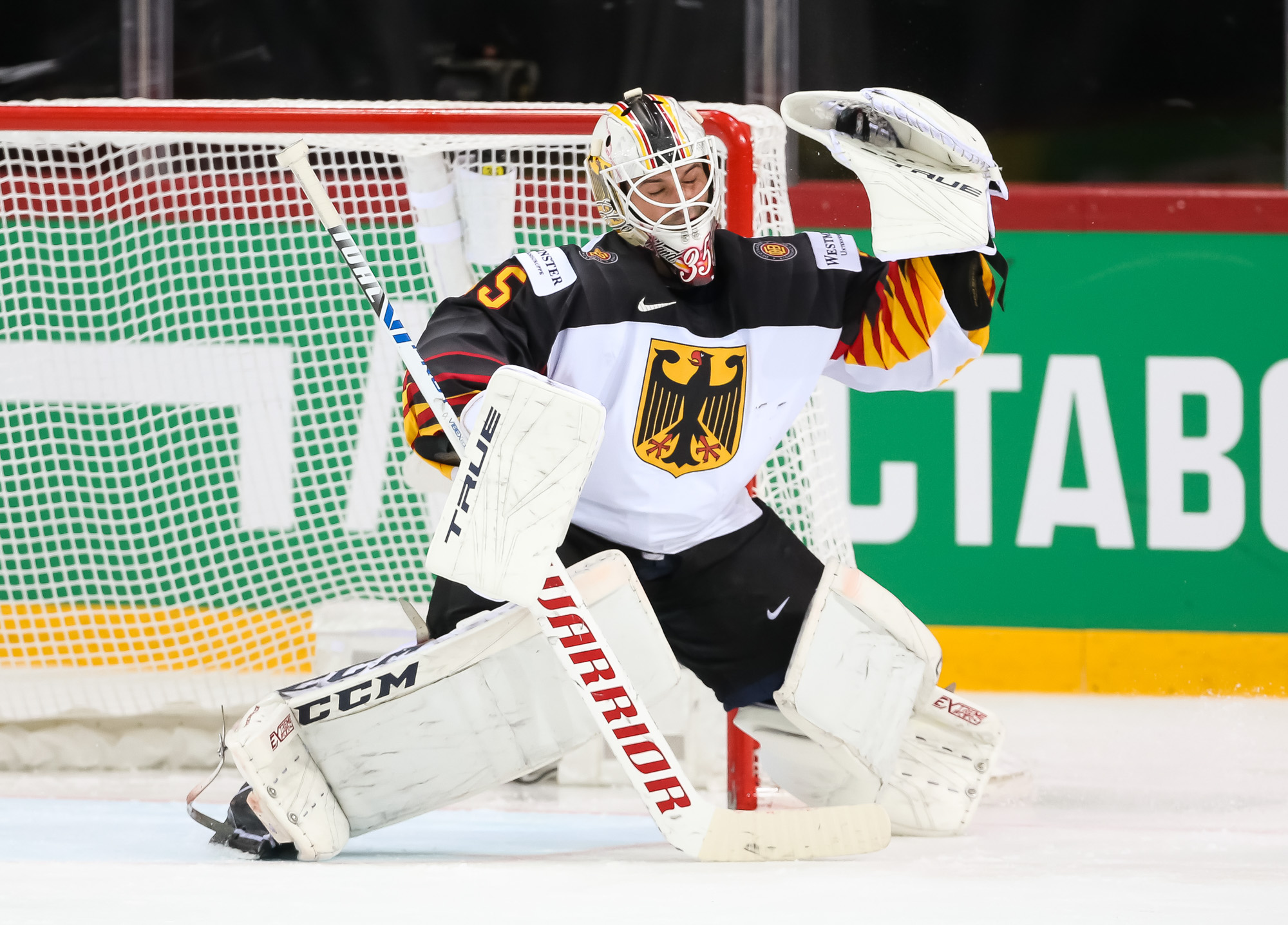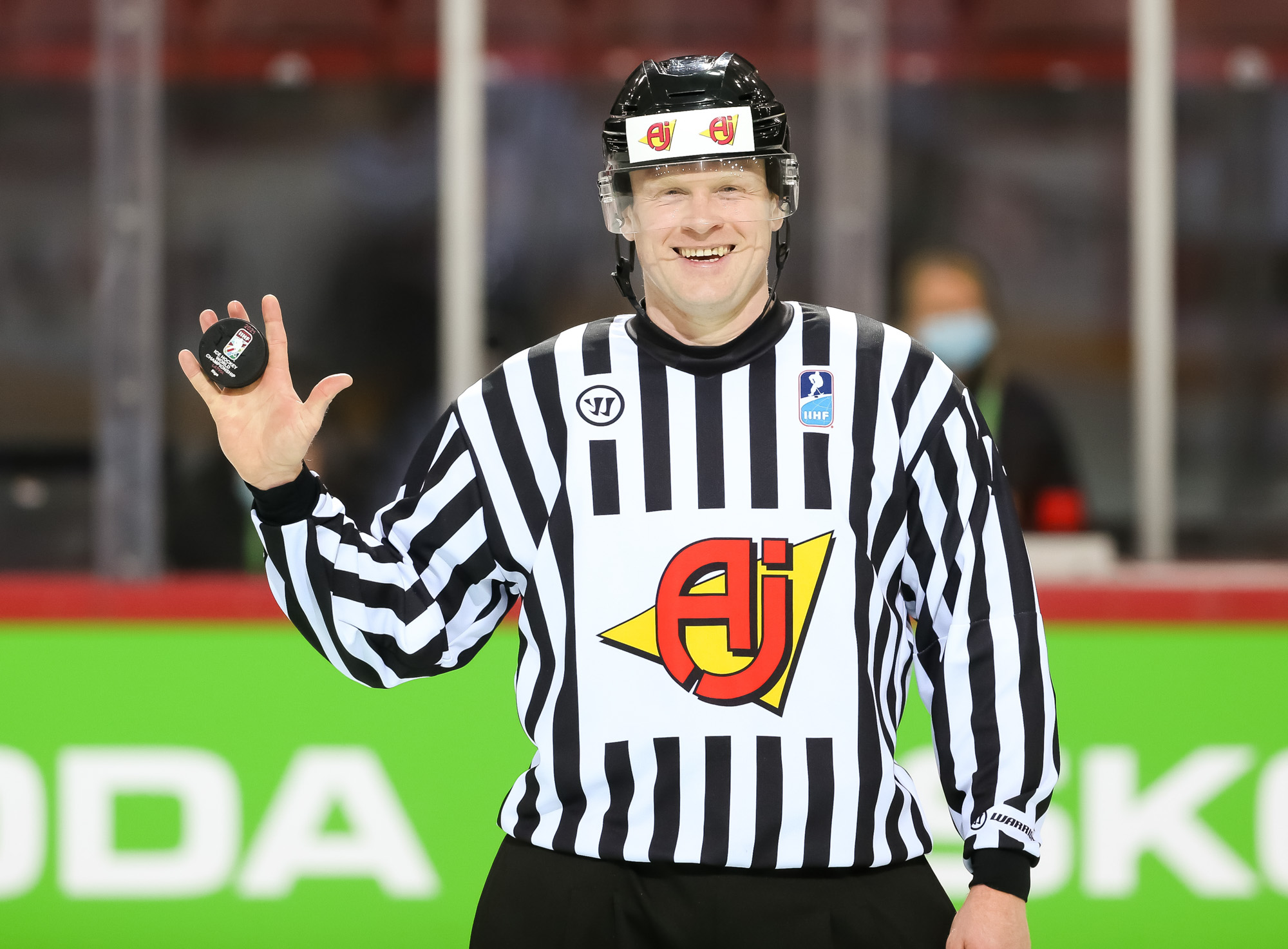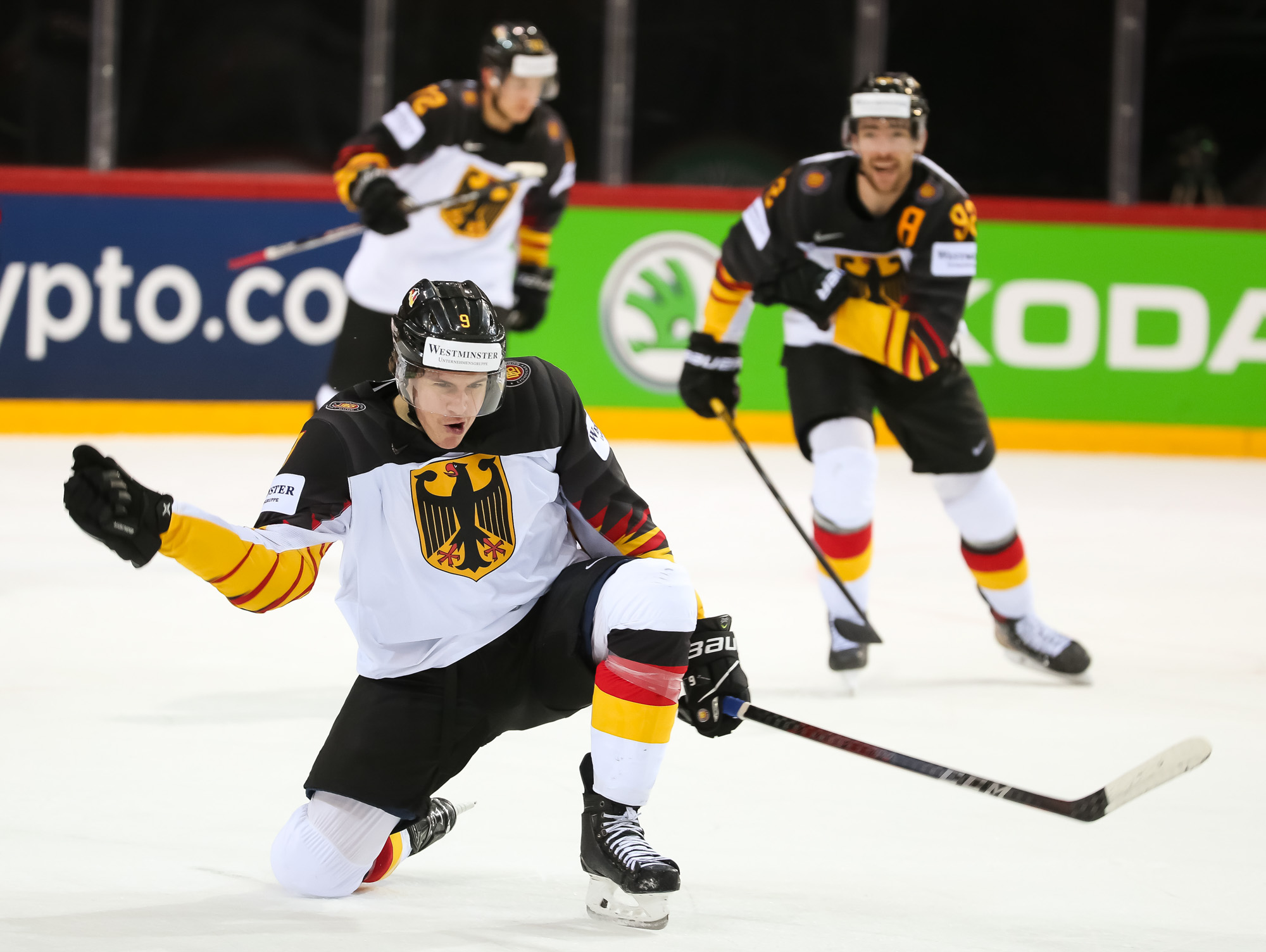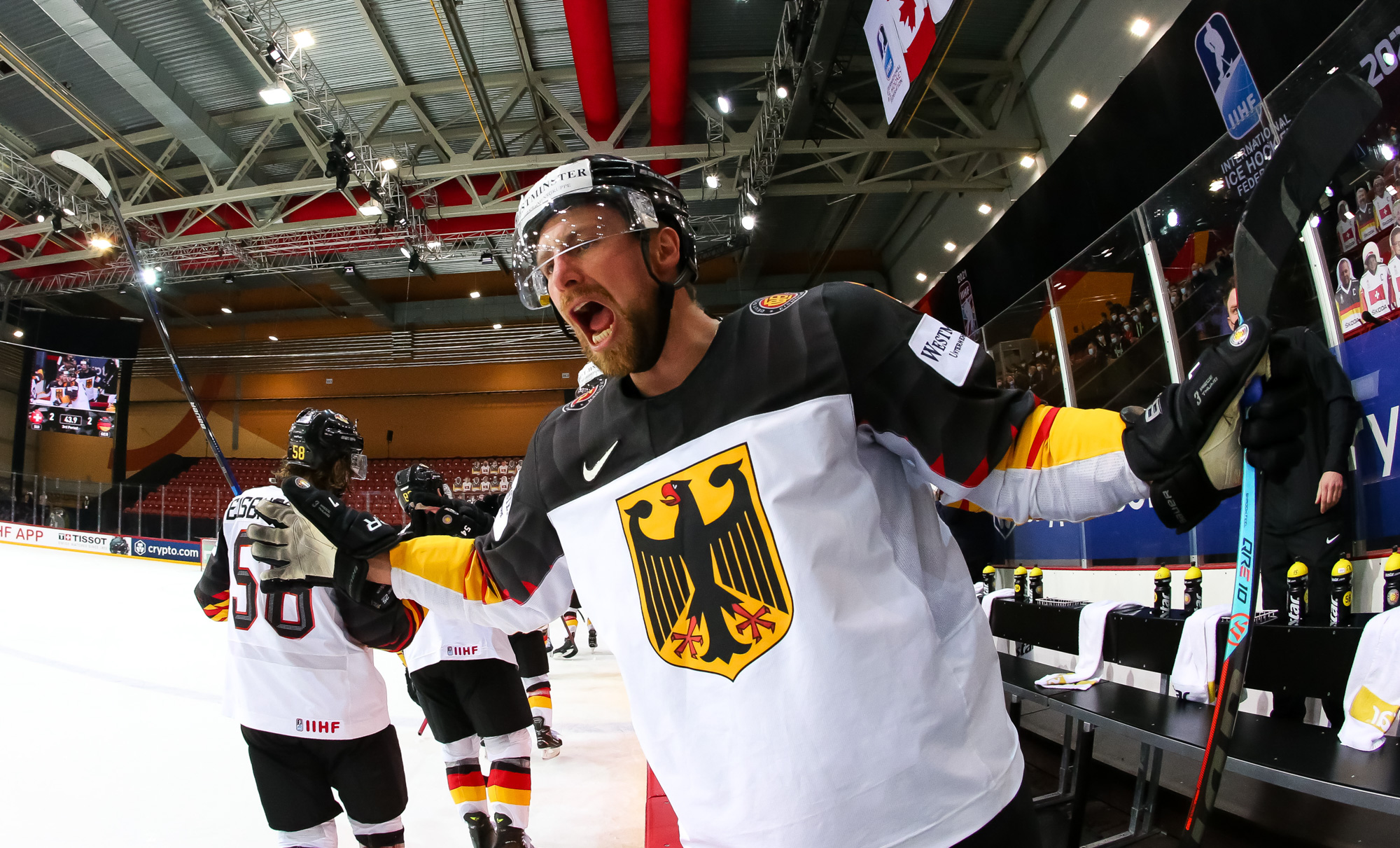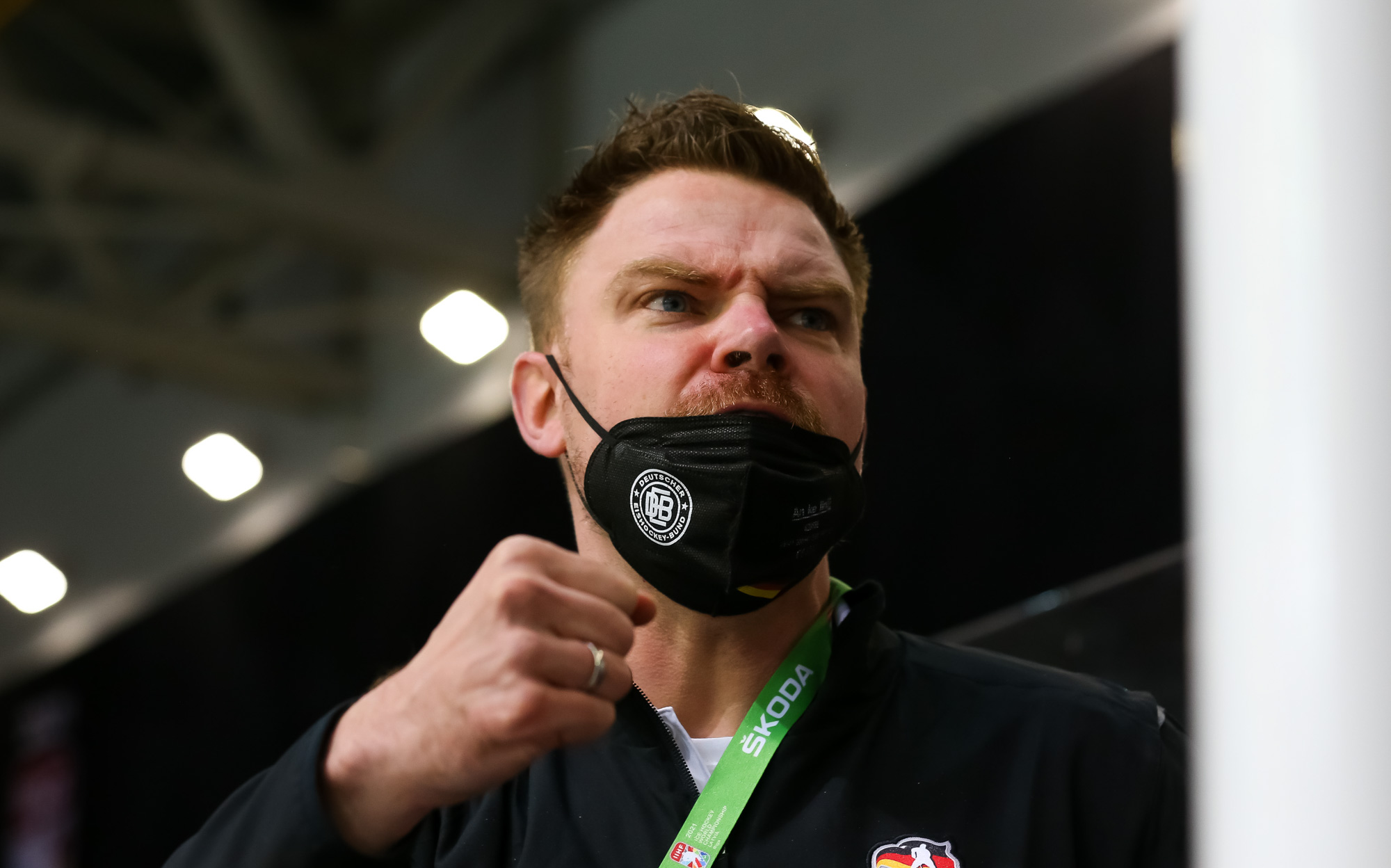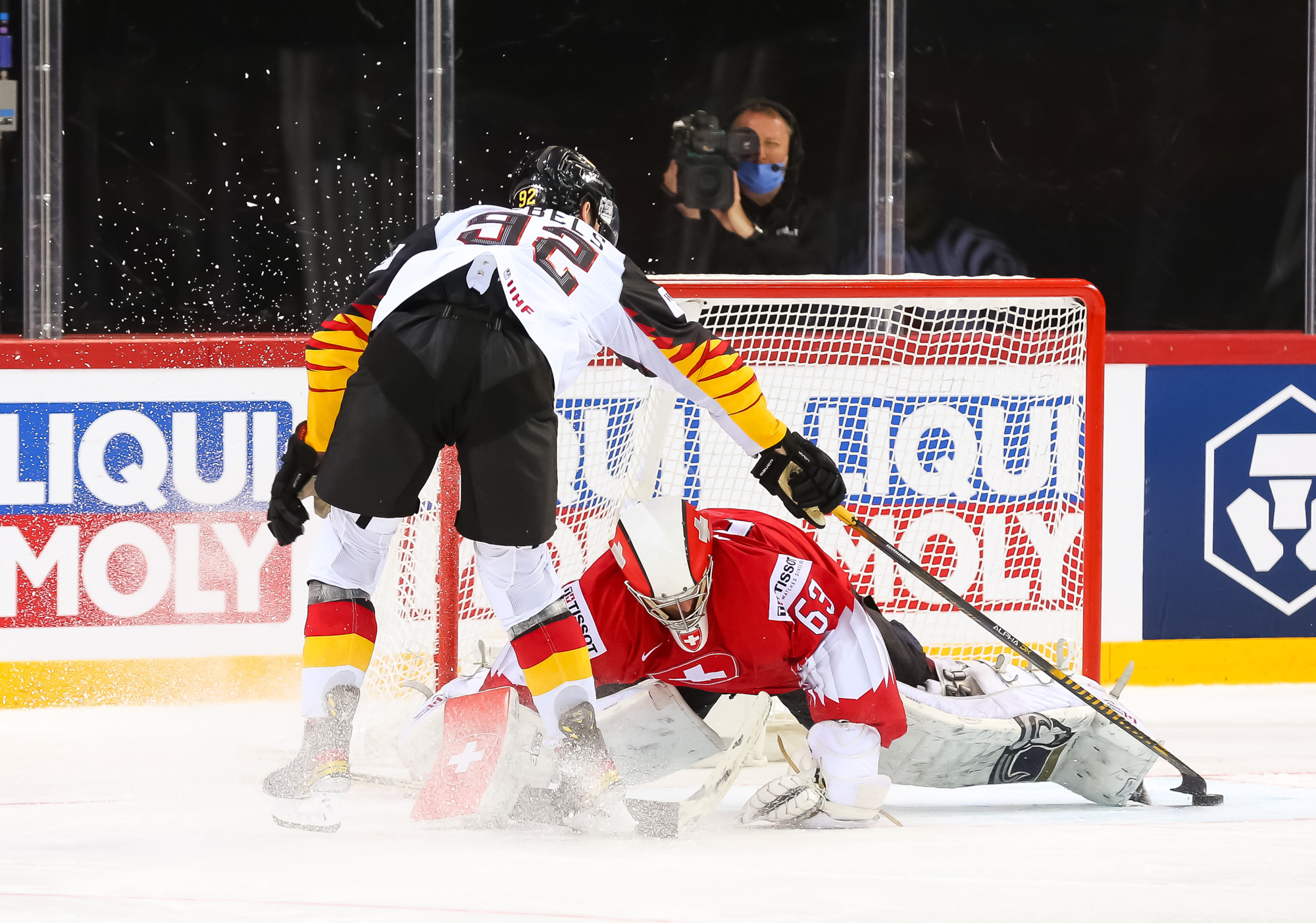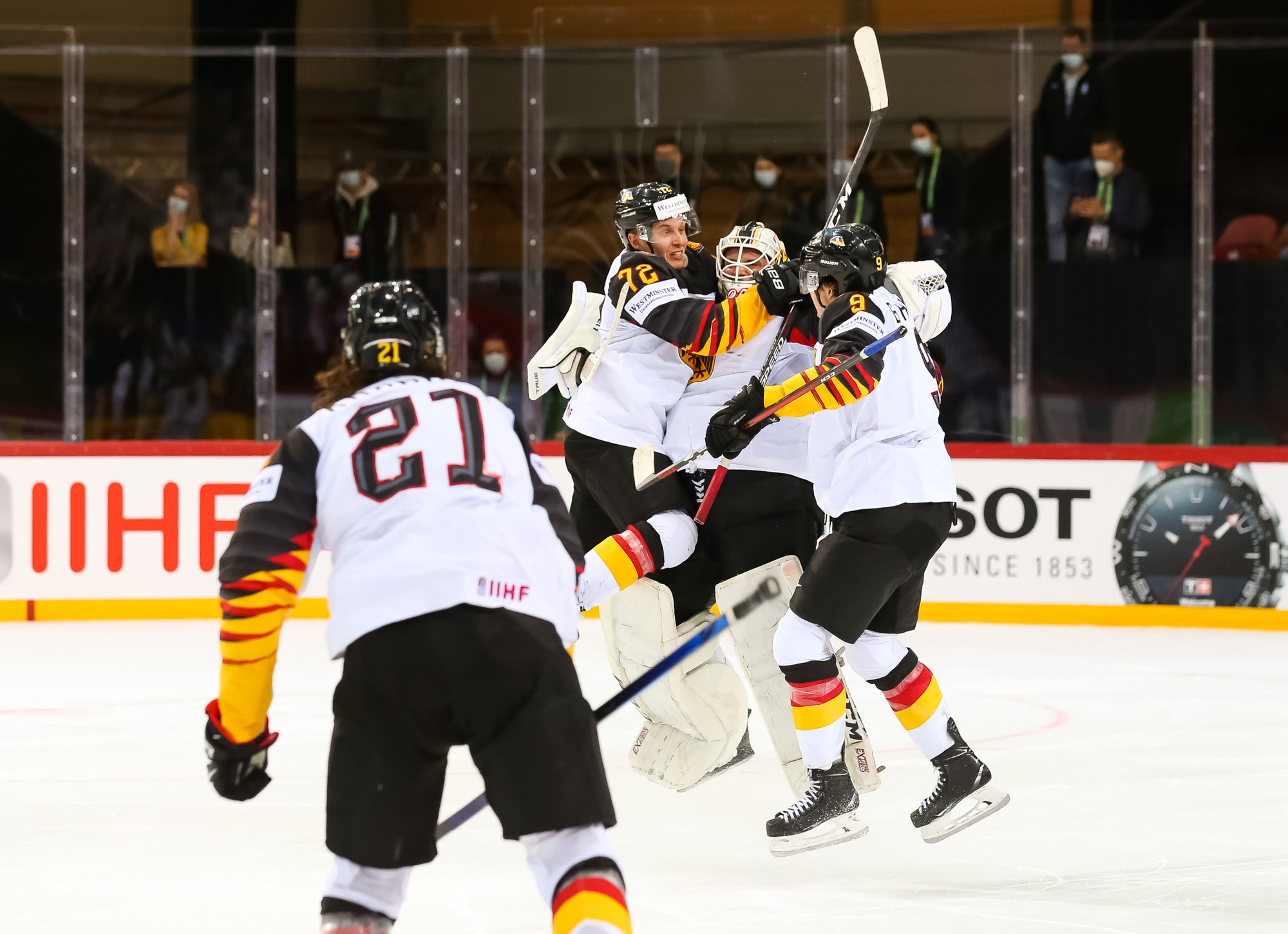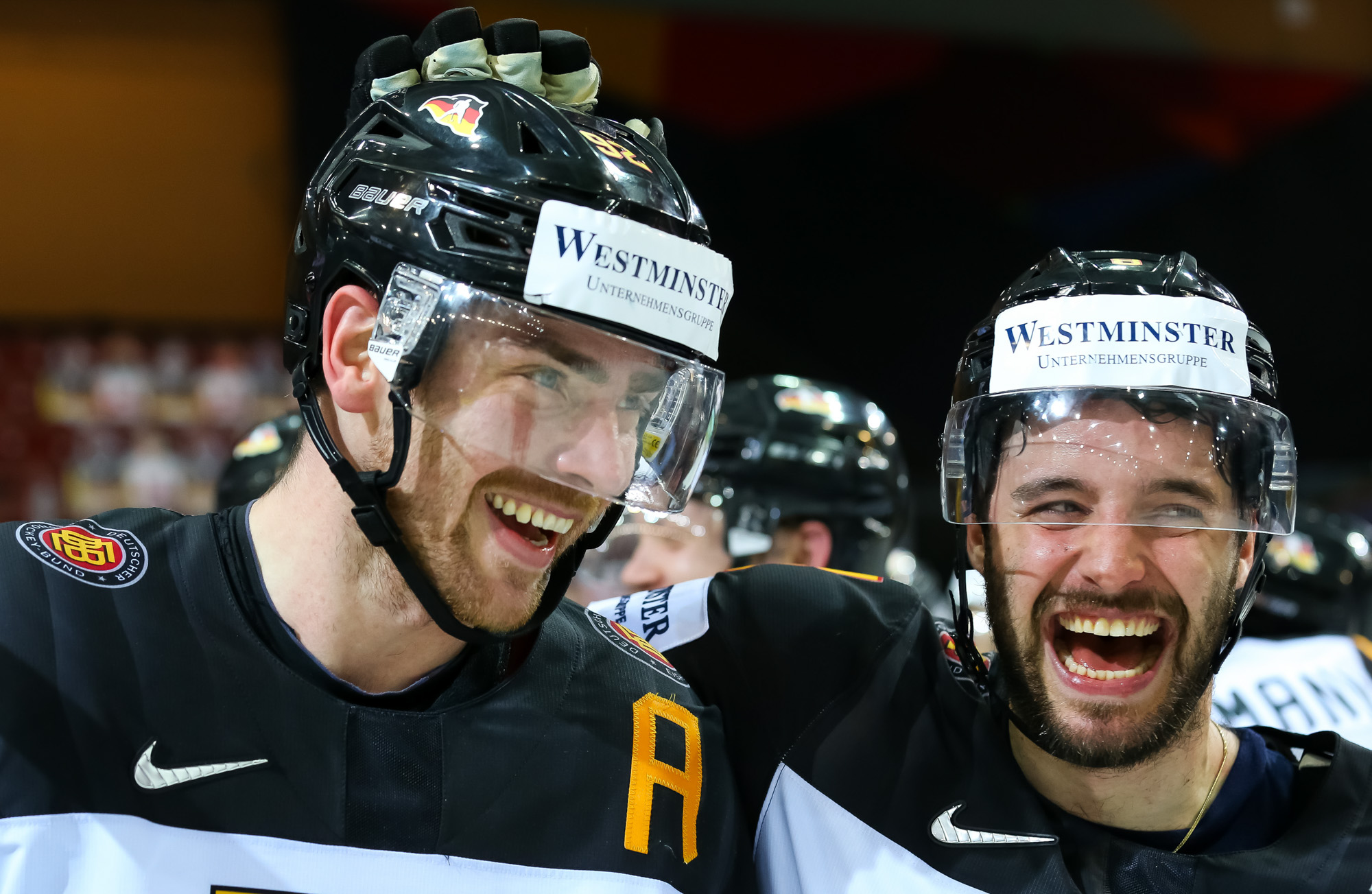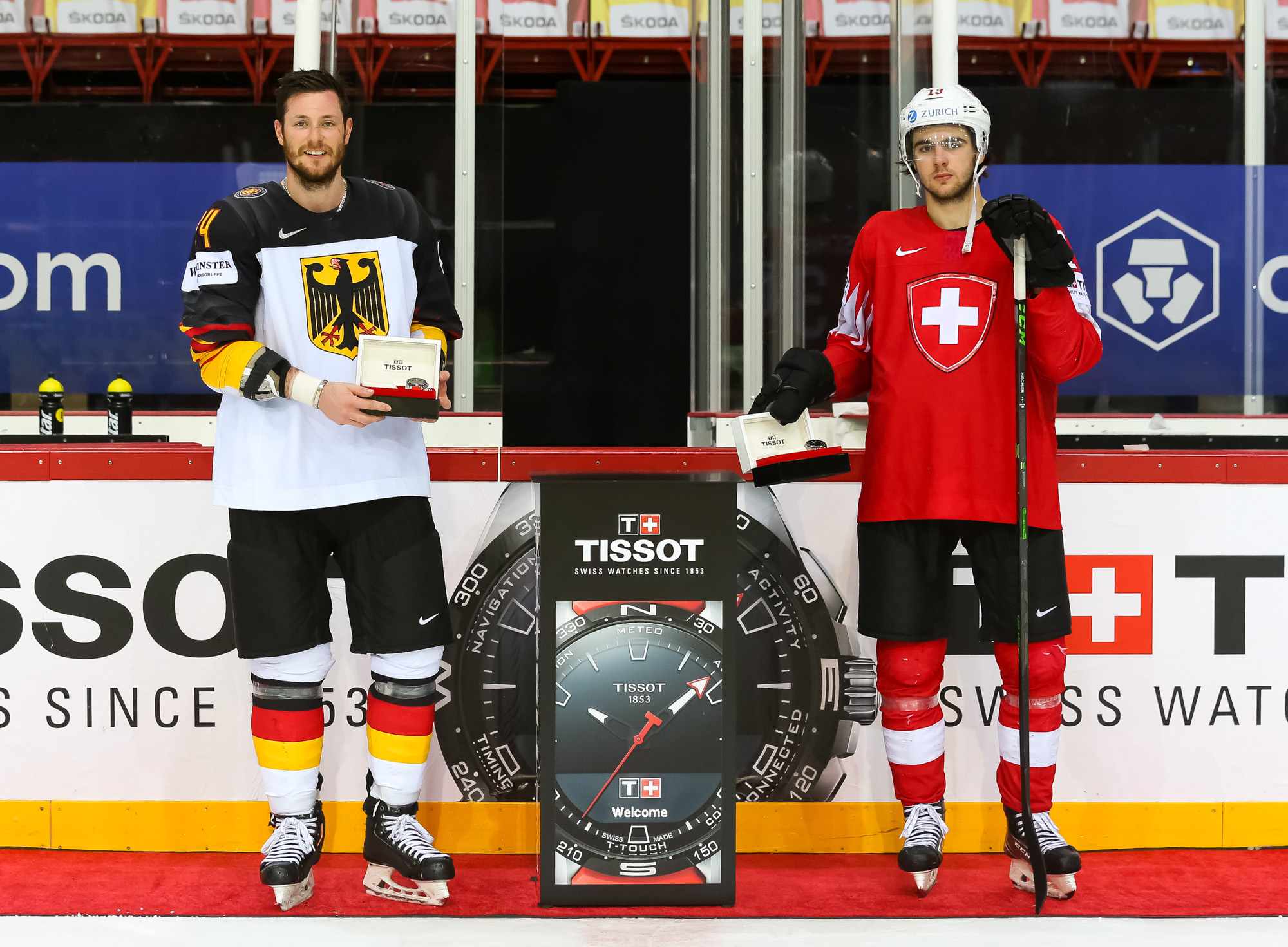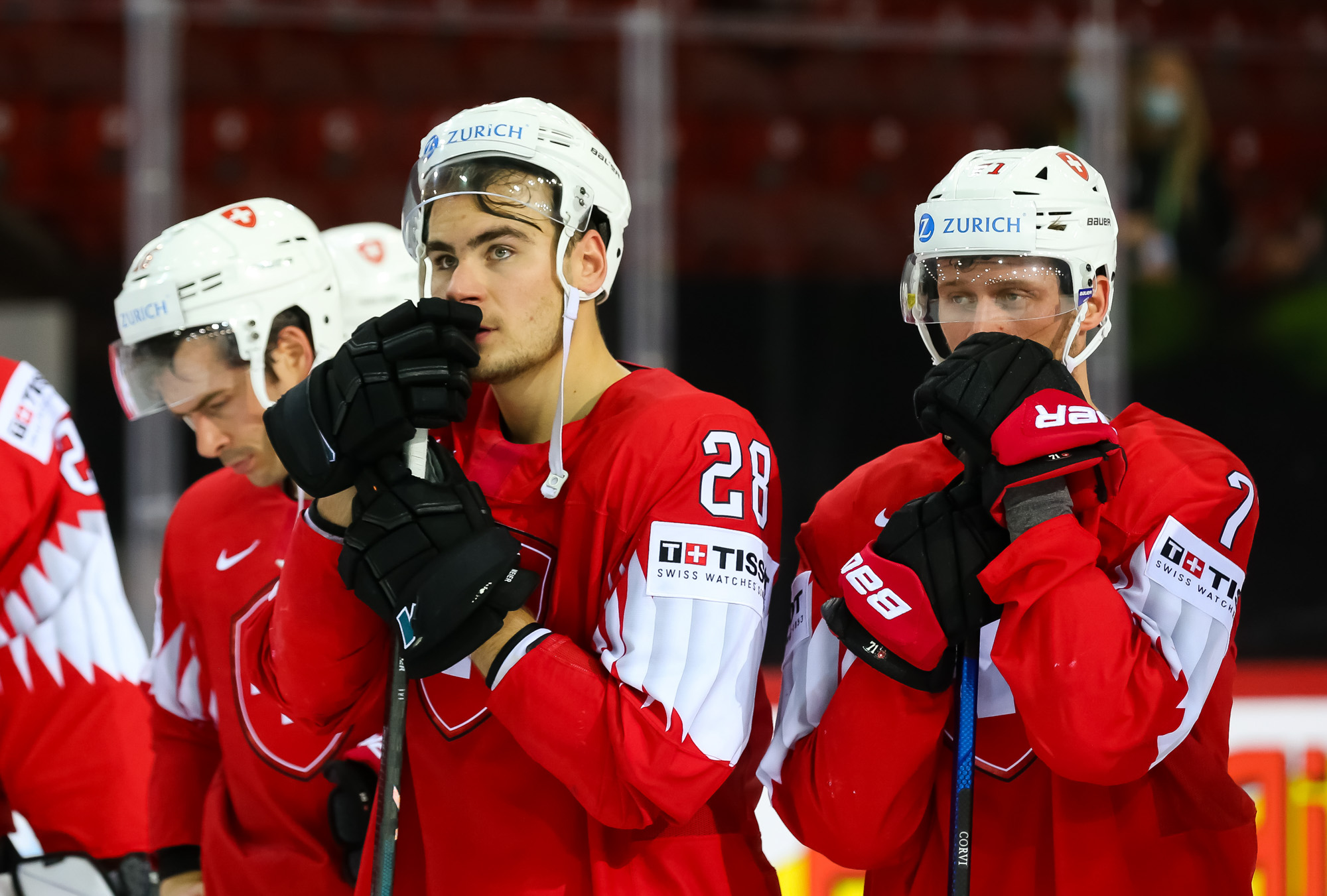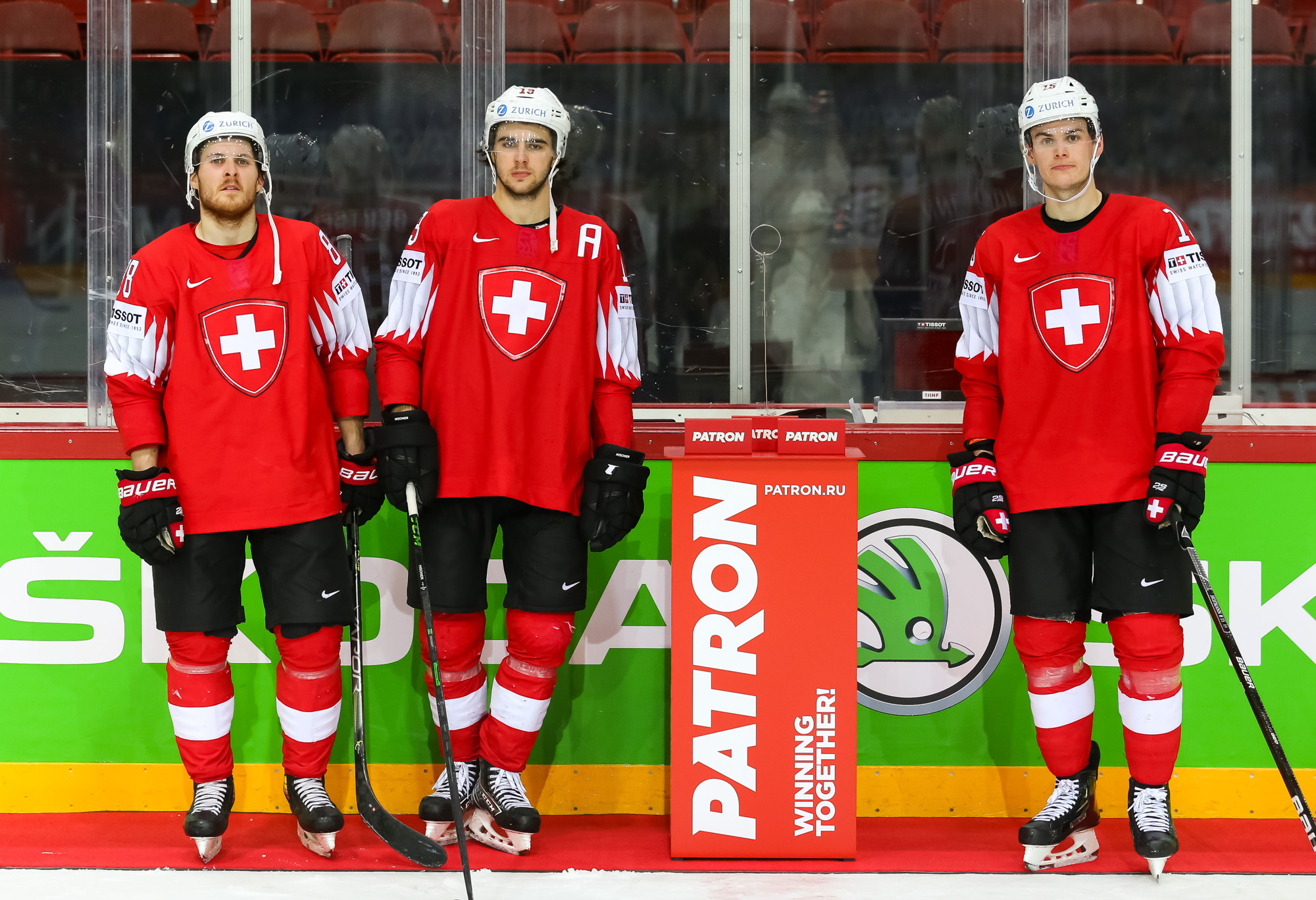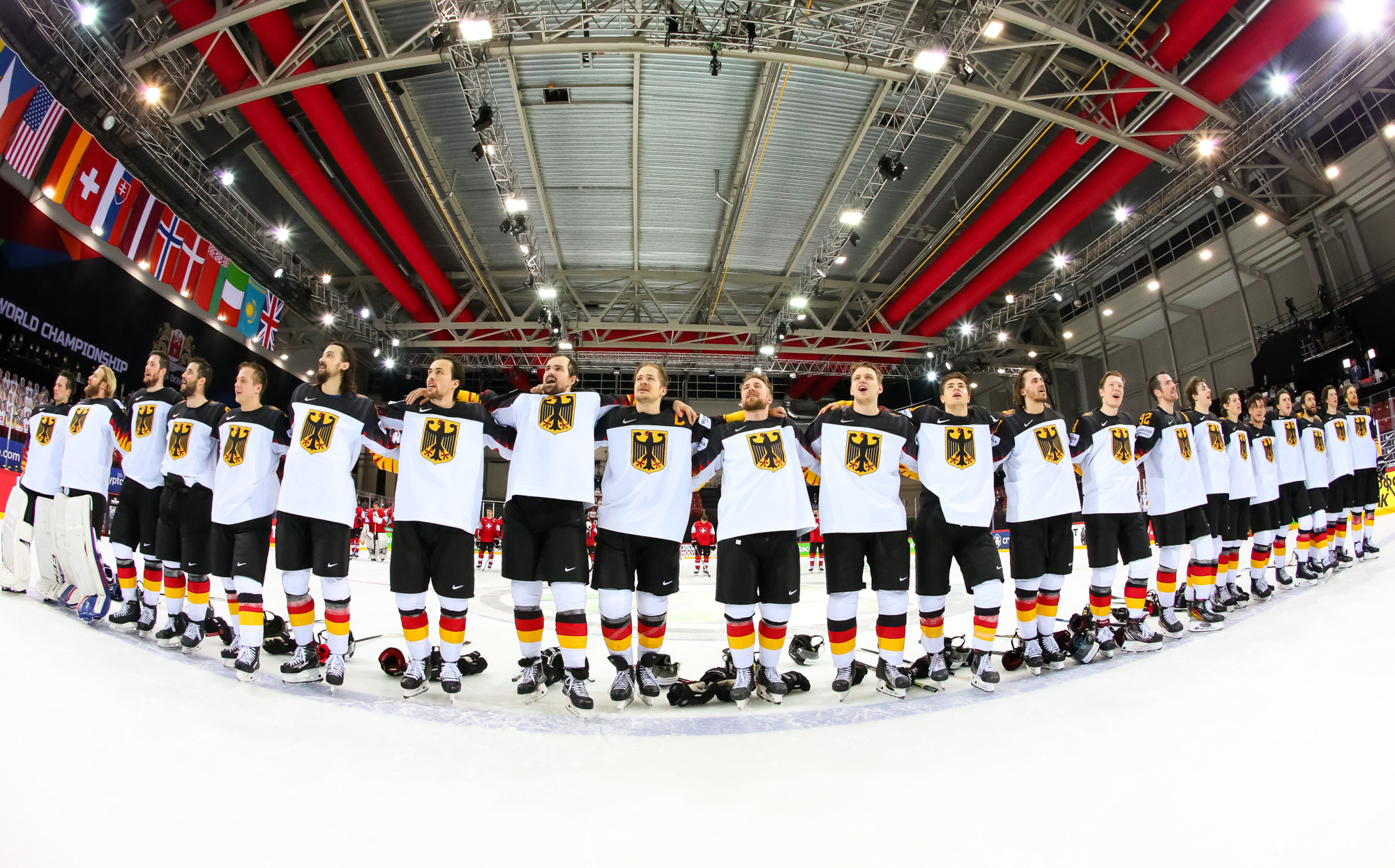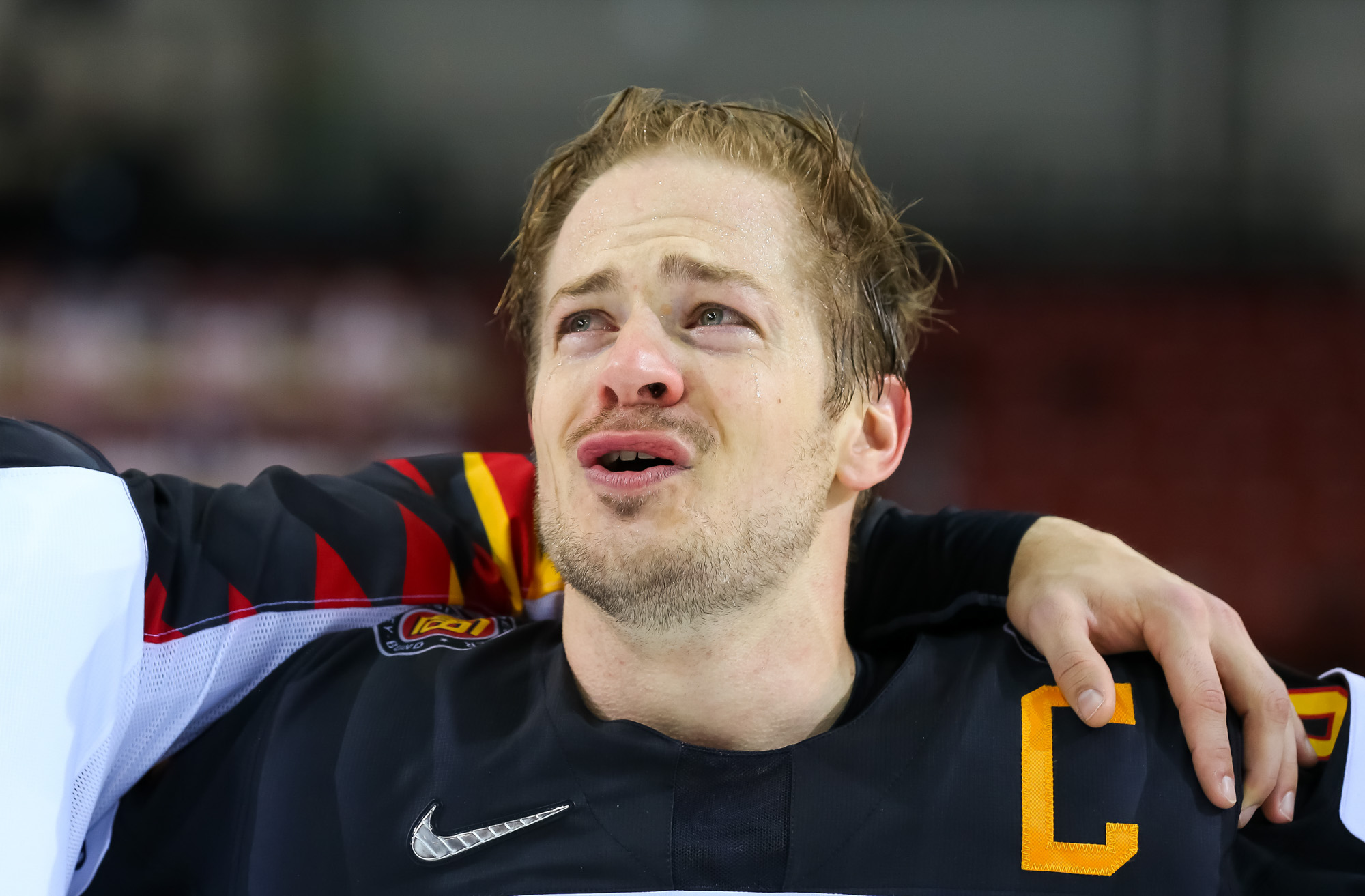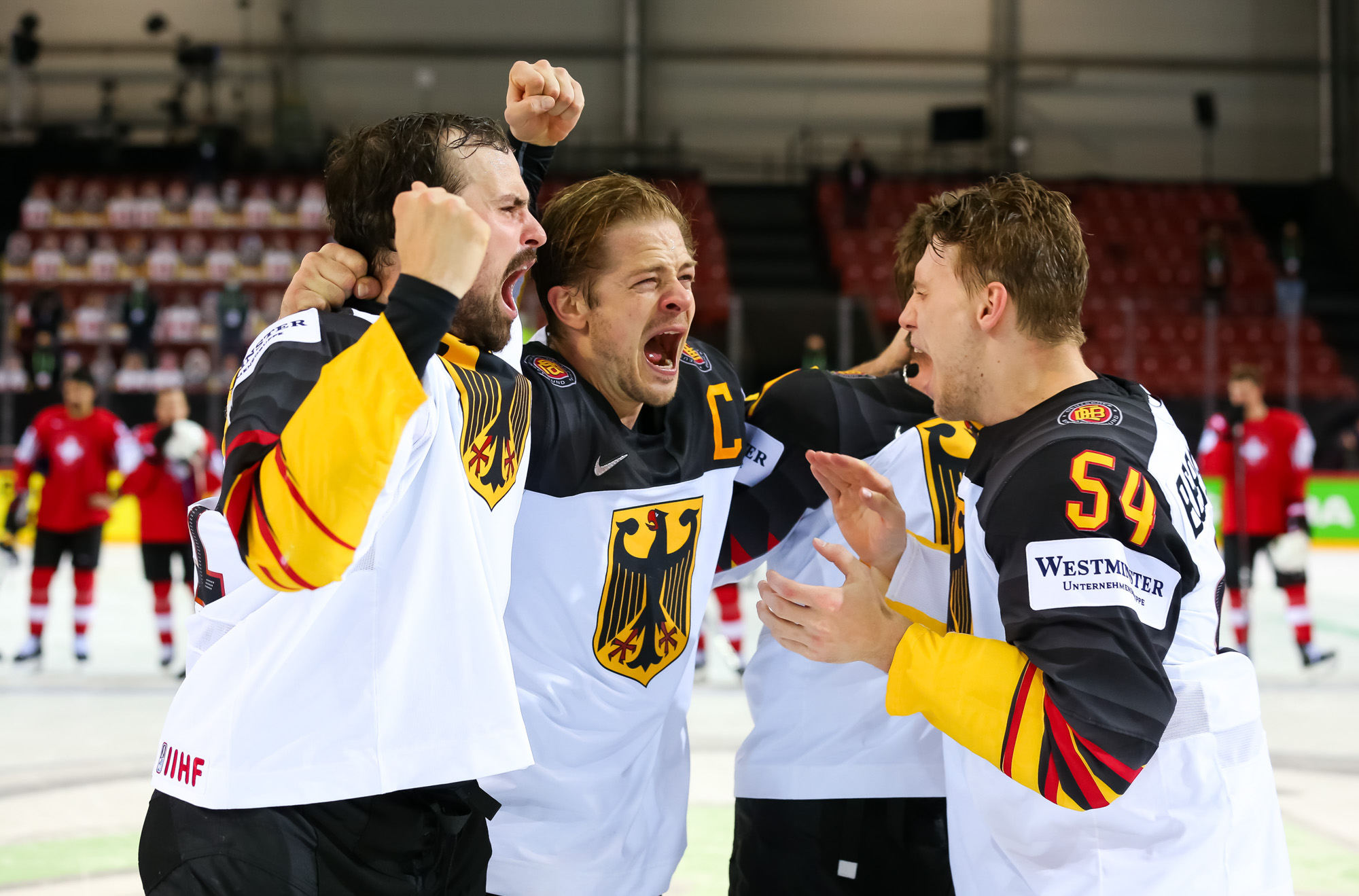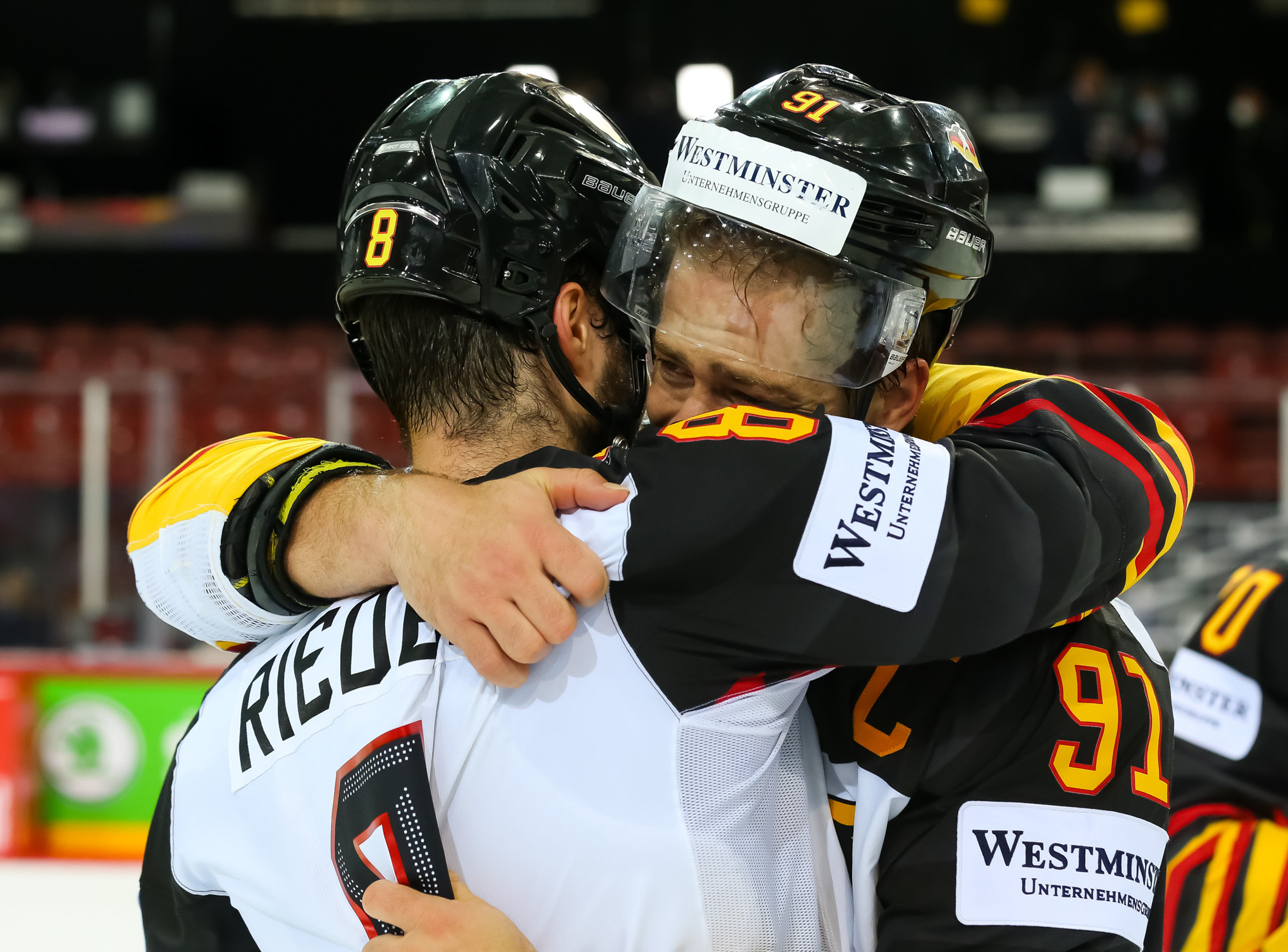German forward Marcel Noebels scores the game-winning goal in the shootout against Swiss goaltender Leonardo Genoni.
photo: Chris Tanouye / HHOF-IIHF Images
Germany advances to the final four of a World Championship for the first time since 2010 after coming from behind to defeat Switzerland in Thursday afternoon’s quarter-final match-up in Riga. A last-minute tying goal saved the Germans in regulation before Marcel Noebels got the decider in a shootout.
For the Swiss, this was another heartbreaking loss in the last eight: two years again in Kosice they were denied by Canada after allowing a tying goal on 59:59; today they blew a 2-0 lead, allowing Leon Gawanke to tie it up at 2-2 on 59:16.
Noebels, who came into the game nursing a shoulder injury from the previous game against Latvia, took the 10th shot of the shootout and pulled off a Forsberg move to beat Leonardo Genoni and send Germany through.
"I knew my heart beat went slower," Noebels said of his decisive effort. "But anyone on our bench could have scored it and I’m just happy we can move on. We came back from a 2-0 lead for the Swiss, that was huge."
Teammate Dominik Kahun, who also scored in the shootout, talked up Noebels' effort. "It was unbelievable," he said. "We were surprised he made that move, and to do it on the final shot was very impressive. He deserved it."
Swiss captain Raphael Diaz admitted that defeat was 'extremely bitter'. "It hurts to concede the last shot in the shootout and they won," he said. But he acknowledged that his team once again showed it could mix with the best. "If you look back to the group stage, this was an unbelievable team effort. We showed we can play with the top, top teams. But right now, it's hard to find words. It's over for us."
Switzerland and Germany have one of the oldest on-going rivalries in hockey - Noebels described it as a 'derby'. Their first meeting was way back in 1910 in European Championship action, and before today their most recent, more than a century later, came at the 2018 Olympics in PyeongChang. On that occasion, Germany’s overtime victory kickstarted a memorable run to the gold-medal game in Korea.
In World Championship play, though, the Swiss had the edge with seven wins and six losses in top division IIHF action before today. Switzerland also has the better medal record, topped up with two silvers in the last decade while Germany’s fourth-place in 2010 was its best result since 1953. 2010 also brought the Germans their most recent World Championship victory over Switzerland, a 1-0 verdict in the ‘Battle of Mannheim’, a quarter-final game that produced 121 penalty minutes.
For the Swiss, this was another heartbreaking loss in the last eight: two years again in Kosice they were denied by Canada after allowing a tying goal on 59:59; today they blew a 2-0 lead, allowing Leon Gawanke to tie it up at 2-2 on 59:16.
Noebels, who came into the game nursing a shoulder injury from the previous game against Latvia, took the 10th shot of the shootout and pulled off a Forsberg move to beat Leonardo Genoni and send Germany through.
"I knew my heart beat went slower," Noebels said of his decisive effort. "But anyone on our bench could have scored it and I’m just happy we can move on. We came back from a 2-0 lead for the Swiss, that was huge."
Teammate Dominik Kahun, who also scored in the shootout, talked up Noebels' effort. "It was unbelievable," he said. "We were surprised he made that move, and to do it on the final shot was very impressive. He deserved it."
Swiss captain Raphael Diaz admitted that defeat was 'extremely bitter'. "It hurts to concede the last shot in the shootout and they won," he said. But he acknowledged that his team once again showed it could mix with the best. "If you look back to the group stage, this was an unbelievable team effort. We showed we can play with the top, top teams. But right now, it's hard to find words. It's over for us."
Switzerland and Germany have one of the oldest on-going rivalries in hockey - Noebels described it as a 'derby'. Their first meeting was way back in 1910 in European Championship action, and before today their most recent, more than a century later, came at the 2018 Olympics in PyeongChang. On that occasion, Germany’s overtime victory kickstarted a memorable run to the gold-medal game in Korea.
In World Championship play, though, the Swiss had the edge with seven wins and six losses in top division IIHF action before today. Switzerland also has the better medal record, topped up with two silvers in the last decade while Germany’s fourth-place in 2010 was its best result since 1953. 2010 also brought the Germans their most recent World Championship victory over Switzerland, a 1-0 verdict in the ‘Battle of Mannheim’, a quarter-final game that produced 121 penalty minutes.
Switzerland vs Germany (QF) - 2021 IIHF Ice Hockey World Championship
SUI vs. GER
Today’s game was far calmer. The first period was cautious, with both teams feeling out each other’s game. But the Swiss got ahead after 15 minutes through defenceman Untersander. He swapped places with Philipp Kurashev and collected Santeri Alatalo’s diagonal feed before beating Mathias Niederberger.
Germany had more shots in that opening stanza, but it was notable that five of its eight attempts came from defencemen. Leading scorer Noebels, whose place on the team was only confirmed on game day, was kept quiet by the Swiss D and there were few clear-cut opportunities for his teammates.
Switzerland’s progress through Group A – where it finished second behind team ROC – was helped by an impressive power play. The Swiss plundered 10 goals on the PP, so when Germany took two penalties in quick succession in the second period, a 5-on-3 situation lasting for 1:39 looked like a potentially game-breaking moment. However, disciplined German defence and a couple of Swiss mis-plays limited the free-scoring Gregory Hofmann to just one shot at Mathias Niederberger before the advantage was over.
With the teams back at full strength, Switzerland did extend its lead. A three-on-three rush saw Moritz Seider get pulled out of position and leave Herzog unattended at the far post. Tristan Scherwey picked out the pass and Herzog duly potted his second goal of the tournament.
Even then, Seider was confident of getting a result. "I think we were the better team from the beginning," said the defenceman. "There was no doubt that we were going to win that game. We can be very proud of ourselves, and now we go to the semis."
And Kahun echoed those thoughts: "What makes our team so good is our confidence, our team spirit. Everyone supports everyone else. We were down 2-0 but we played pretty well. Those were unfortunate goals, but we knew we were going to come back. We showed we’re great team."
Even so, at 0-2, Germany was in trouble. Although it was leading the shot count, Toni Soderholm’s team had not managed to seriously test Leonardo Genoni in the opposition net. But that all changed after 37 minutes when, at last, the German offence managed to get bodies in front of the net and pick up some rebounds. Marco Nowak and Tobias Rieder banged in shots before Tom Kuhnhackl found a way past Genoni and revived Germany’s hopes.
The second session ended with Germany going close again. Kuhnhackl fired in a hard pass from the blue line and Stefan Loibl took on the puck in front of Genoni but was unable to beat the EV Zug goaltender.
The third period was all about game management. Germany tried to get its offence going but found it hard to unpick a well-drilled Swiss defence and get good looks at Genoni's net. Switzerland, less preoccupied with extending its lead, was happy to eat up the clock but eased off on its attacking play - as captain Raphael Diaz admitted.
"In the last period we didn’t play our game anymore," he said. "We were pretty strong defensively but we didn‘t make our plays, we just chipped the puck out and went for a change. We needed to keep our system and keep doing our plays until the end."
And that lack of ambition was punished with just 44 seconds left. Noebels found Dominik Kahun on the doorstep. He threaded the puck through a crowded crease to Gawanke, lurking in the space beyond the scrummage. There wasn't much for the 22-year-old D-man to aim at but somehow he found the tightest of lanes to the net and tied the game.
"They didn't have many chances, maybe they had a lot of the outside, but in the end they got the bounce there," lamented Diaz.
Overtime was a cagey affair, but Germany had a glorious chance to win it when Lukas Reiffel poked the puck between Hofmann's skates and went through on goal, only for the Swiss forward to recover sufficiently to force his opponent into fanning on the shot. At the other end, Janis Moser drew a save from Niederberger but neither team could find the break-through.
"We handled ourselves well," said Seider. "Every team wants to win in overtime but you have to be very cautious about your choices because if you don't use them right, the puck will end up in the back of your net."
And Kahun is already looking forward to the semi-finals after his country proved a point once again. "German hockey is always getting better but we always hear we’re not among the big favourites," he said. "The Swiss said we’re the weakest opponent for them but we proved them wrong."
Germany had more shots in that opening stanza, but it was notable that five of its eight attempts came from defencemen. Leading scorer Noebels, whose place on the team was only confirmed on game day, was kept quiet by the Swiss D and there were few clear-cut opportunities for his teammates.
Switzerland’s progress through Group A – where it finished second behind team ROC – was helped by an impressive power play. The Swiss plundered 10 goals on the PP, so when Germany took two penalties in quick succession in the second period, a 5-on-3 situation lasting for 1:39 looked like a potentially game-breaking moment. However, disciplined German defence and a couple of Swiss mis-plays limited the free-scoring Gregory Hofmann to just one shot at Mathias Niederberger before the advantage was over.
With the teams back at full strength, Switzerland did extend its lead. A three-on-three rush saw Moritz Seider get pulled out of position and leave Herzog unattended at the far post. Tristan Scherwey picked out the pass and Herzog duly potted his second goal of the tournament.
Even then, Seider was confident of getting a result. "I think we were the better team from the beginning," said the defenceman. "There was no doubt that we were going to win that game. We can be very proud of ourselves, and now we go to the semis."
And Kahun echoed those thoughts: "What makes our team so good is our confidence, our team spirit. Everyone supports everyone else. We were down 2-0 but we played pretty well. Those were unfortunate goals, but we knew we were going to come back. We showed we’re great team."
Even so, at 0-2, Germany was in trouble. Although it was leading the shot count, Toni Soderholm’s team had not managed to seriously test Leonardo Genoni in the opposition net. But that all changed after 37 minutes when, at last, the German offence managed to get bodies in front of the net and pick up some rebounds. Marco Nowak and Tobias Rieder banged in shots before Tom Kuhnhackl found a way past Genoni and revived Germany’s hopes.
The second session ended with Germany going close again. Kuhnhackl fired in a hard pass from the blue line and Stefan Loibl took on the puck in front of Genoni but was unable to beat the EV Zug goaltender.
The third period was all about game management. Germany tried to get its offence going but found it hard to unpick a well-drilled Swiss defence and get good looks at Genoni's net. Switzerland, less preoccupied with extending its lead, was happy to eat up the clock but eased off on its attacking play - as captain Raphael Diaz admitted.
"In the last period we didn’t play our game anymore," he said. "We were pretty strong defensively but we didn‘t make our plays, we just chipped the puck out and went for a change. We needed to keep our system and keep doing our plays until the end."
And that lack of ambition was punished with just 44 seconds left. Noebels found Dominik Kahun on the doorstep. He threaded the puck through a crowded crease to Gawanke, lurking in the space beyond the scrummage. There wasn't much for the 22-year-old D-man to aim at but somehow he found the tightest of lanes to the net and tied the game.
"They didn't have many chances, maybe they had a lot of the outside, but in the end they got the bounce there," lamented Diaz.
Overtime was a cagey affair, but Germany had a glorious chance to win it when Lukas Reiffel poked the puck between Hofmann's skates and went through on goal, only for the Swiss forward to recover sufficiently to force his opponent into fanning on the shot. At the other end, Janis Moser drew a save from Niederberger but neither team could find the break-through.
"We handled ourselves well," said Seider. "Every team wants to win in overtime but you have to be very cautious about your choices because if you don't use them right, the puck will end up in the back of your net."
And Kahun is already looking forward to the semi-finals after his country proved a point once again. "German hockey is always getting better but we always hear we’re not among the big favourites," he said. "The Swiss said we’re the weakest opponent for them but we proved them wrong."
Switzerland vs Germany (QF) - 2021 IIHF Ice Hockey World Championship
OF

